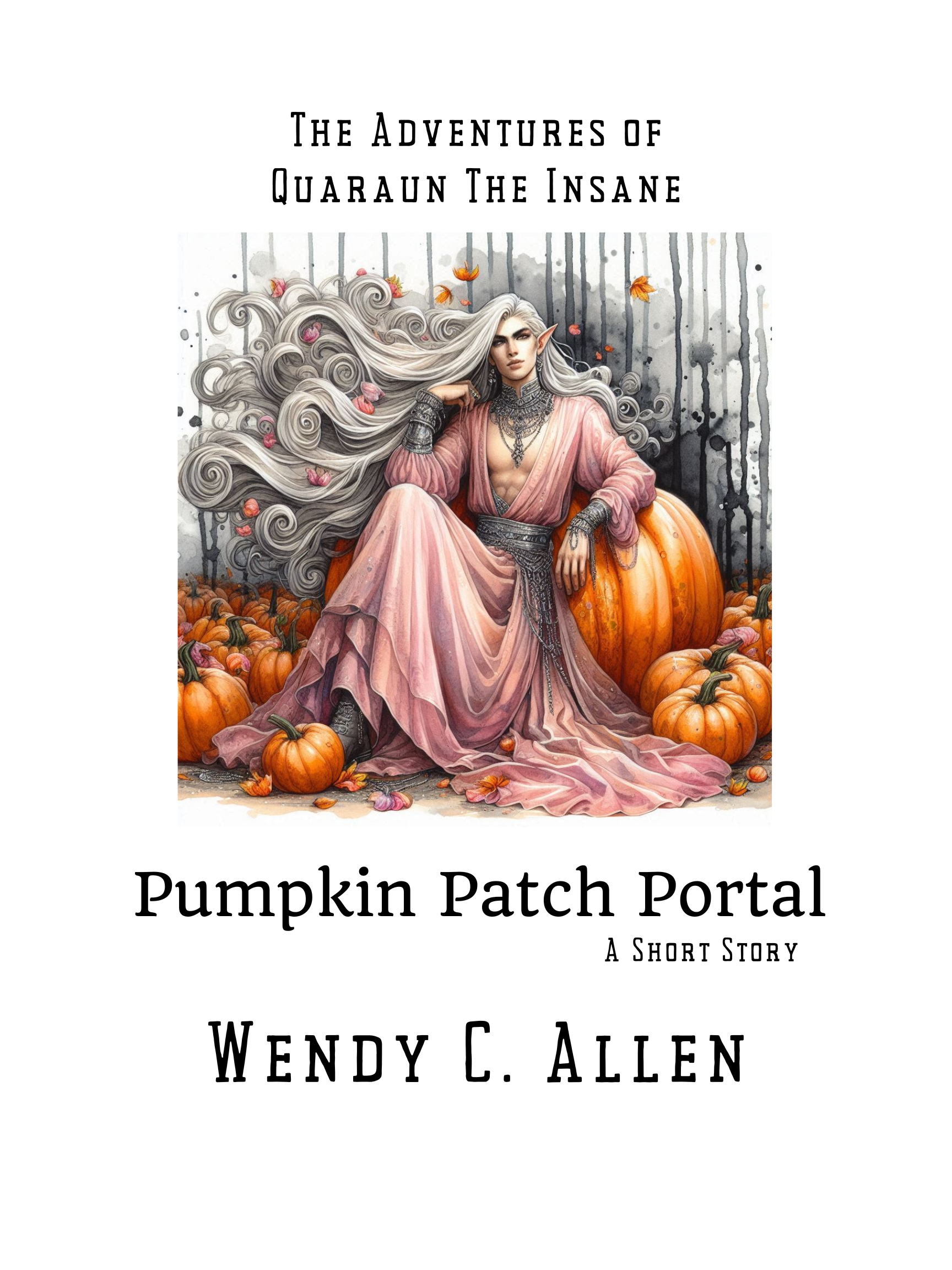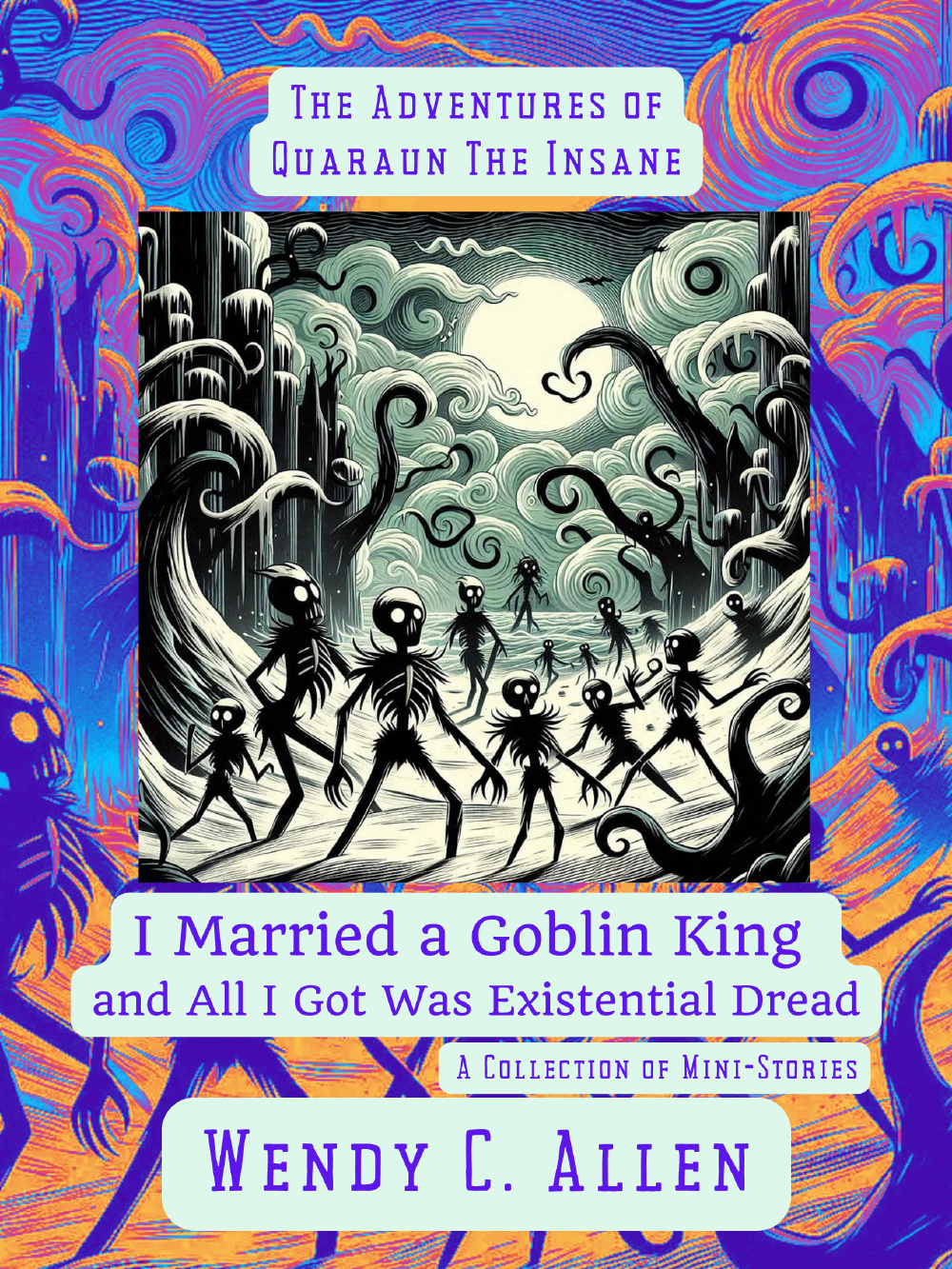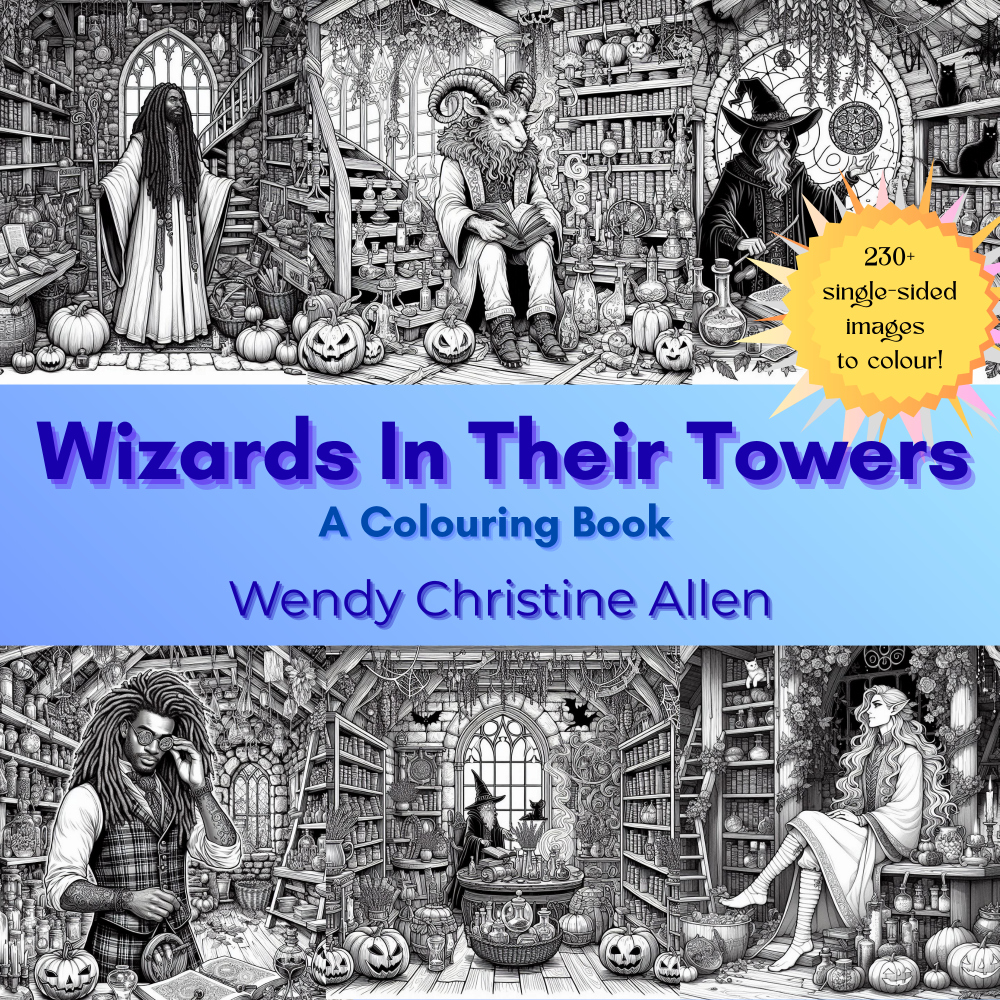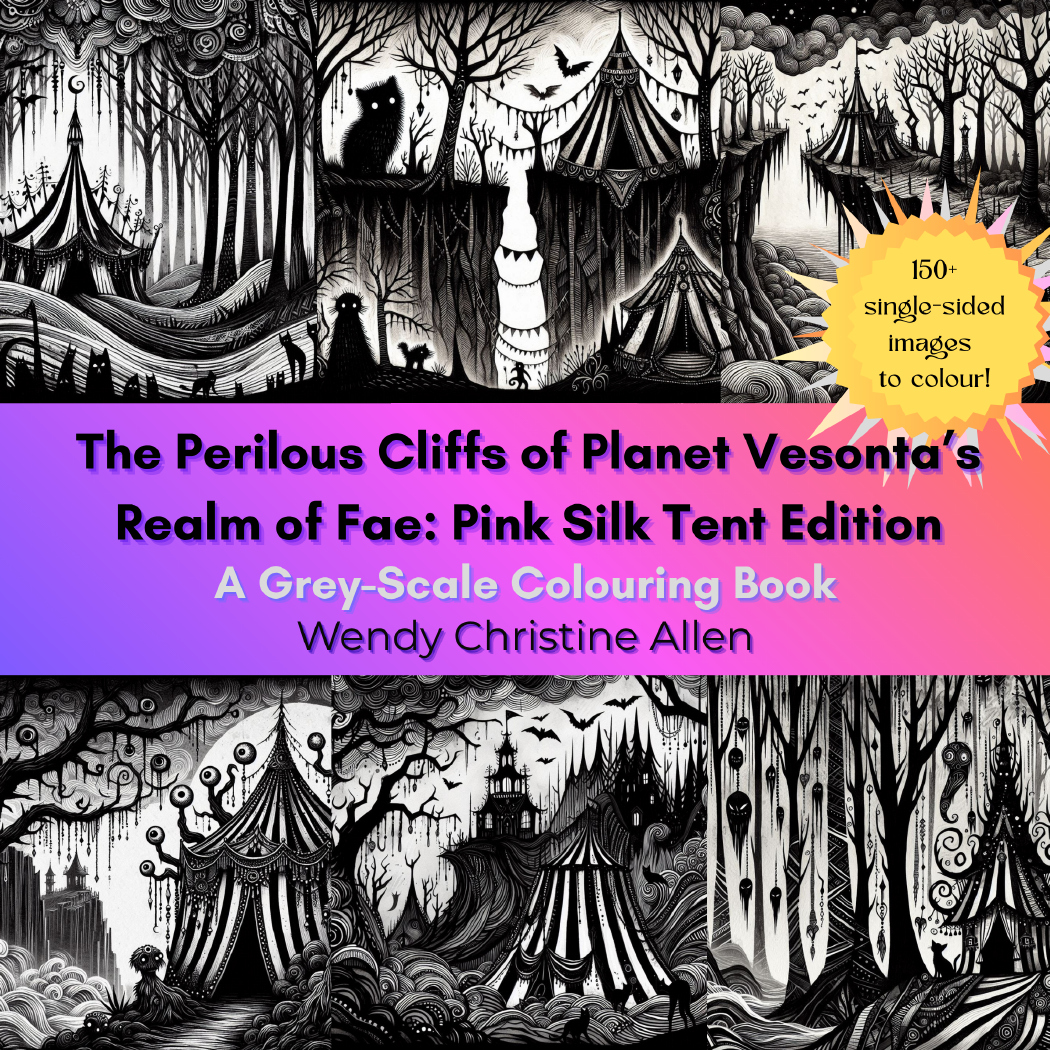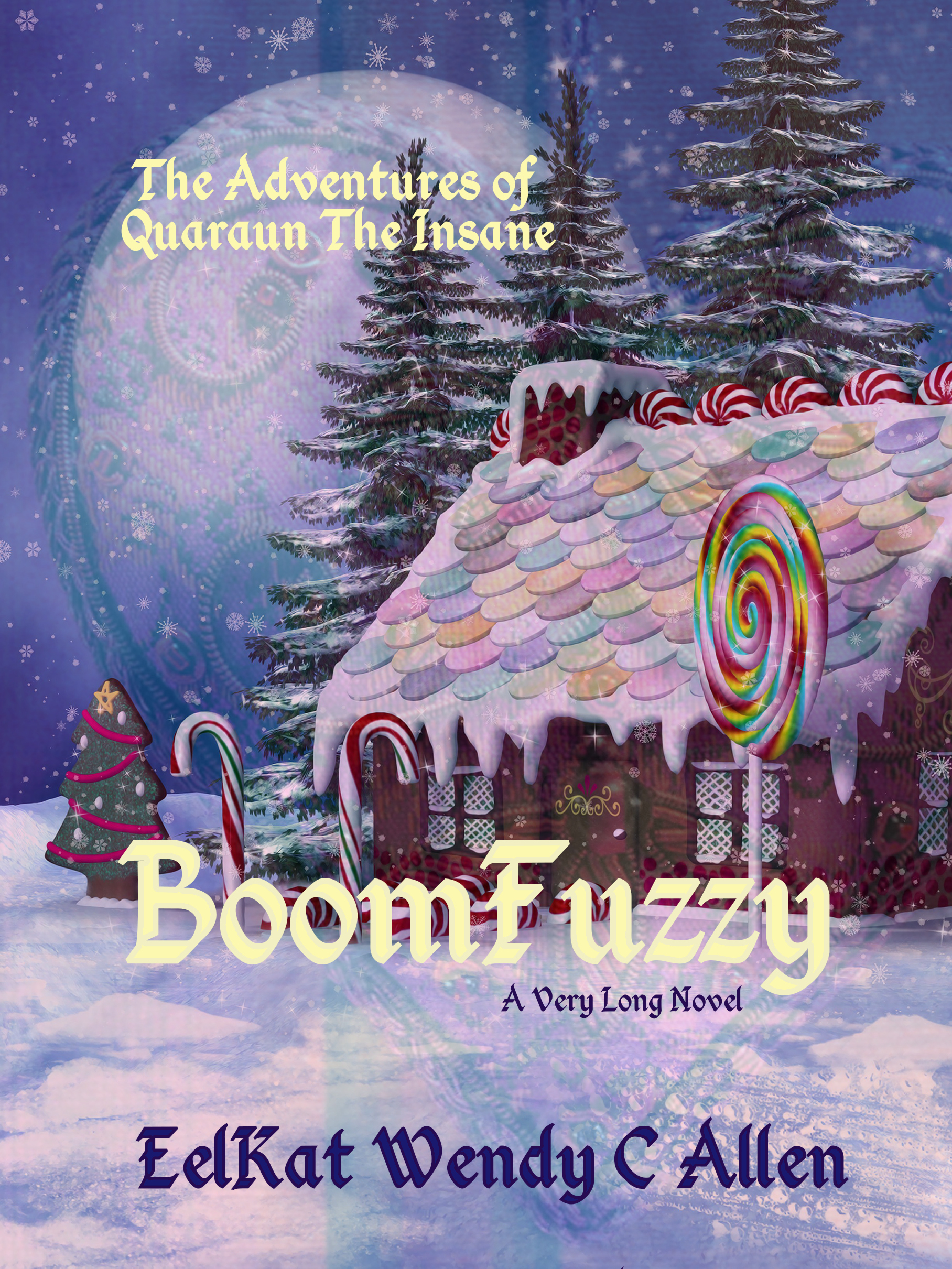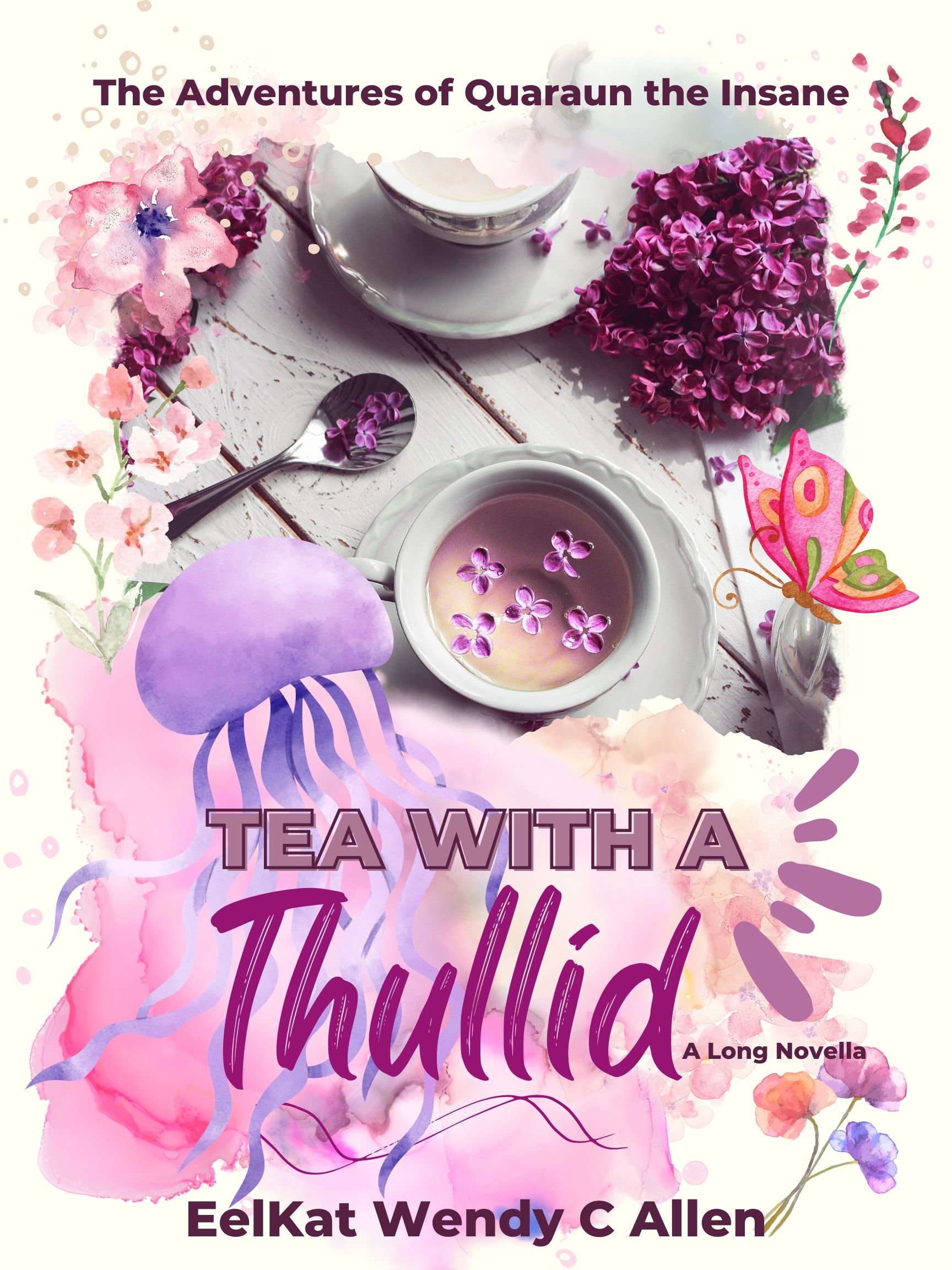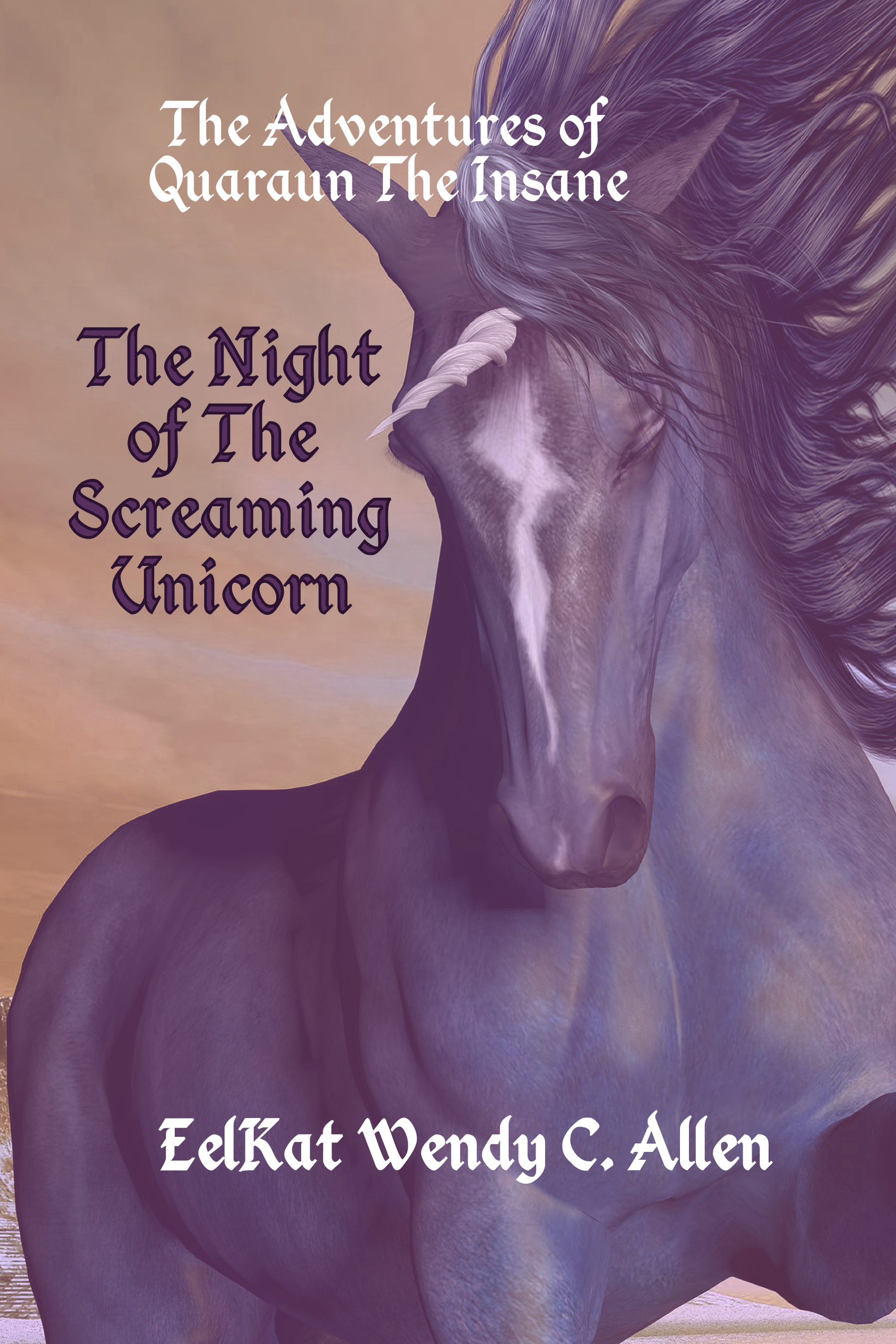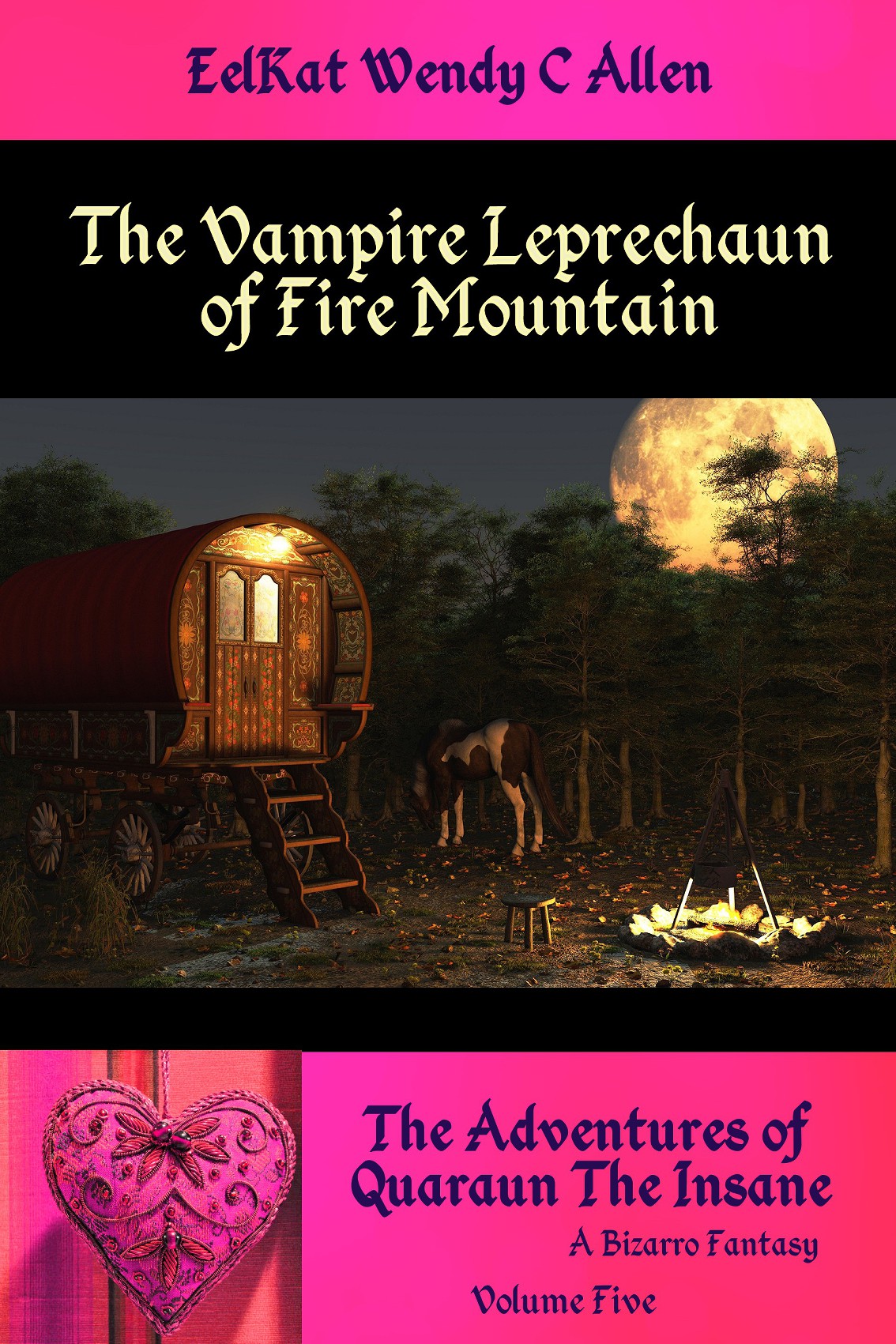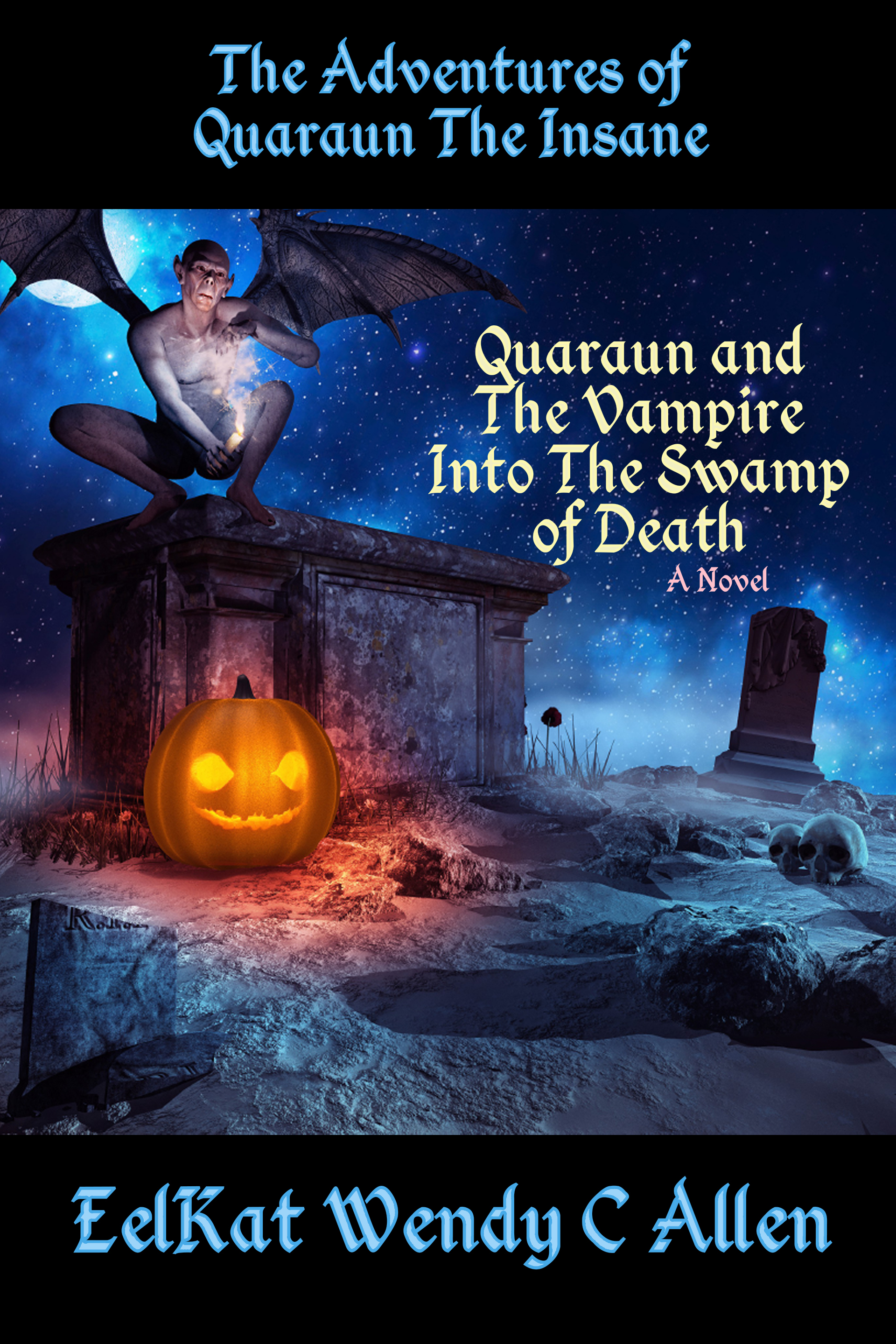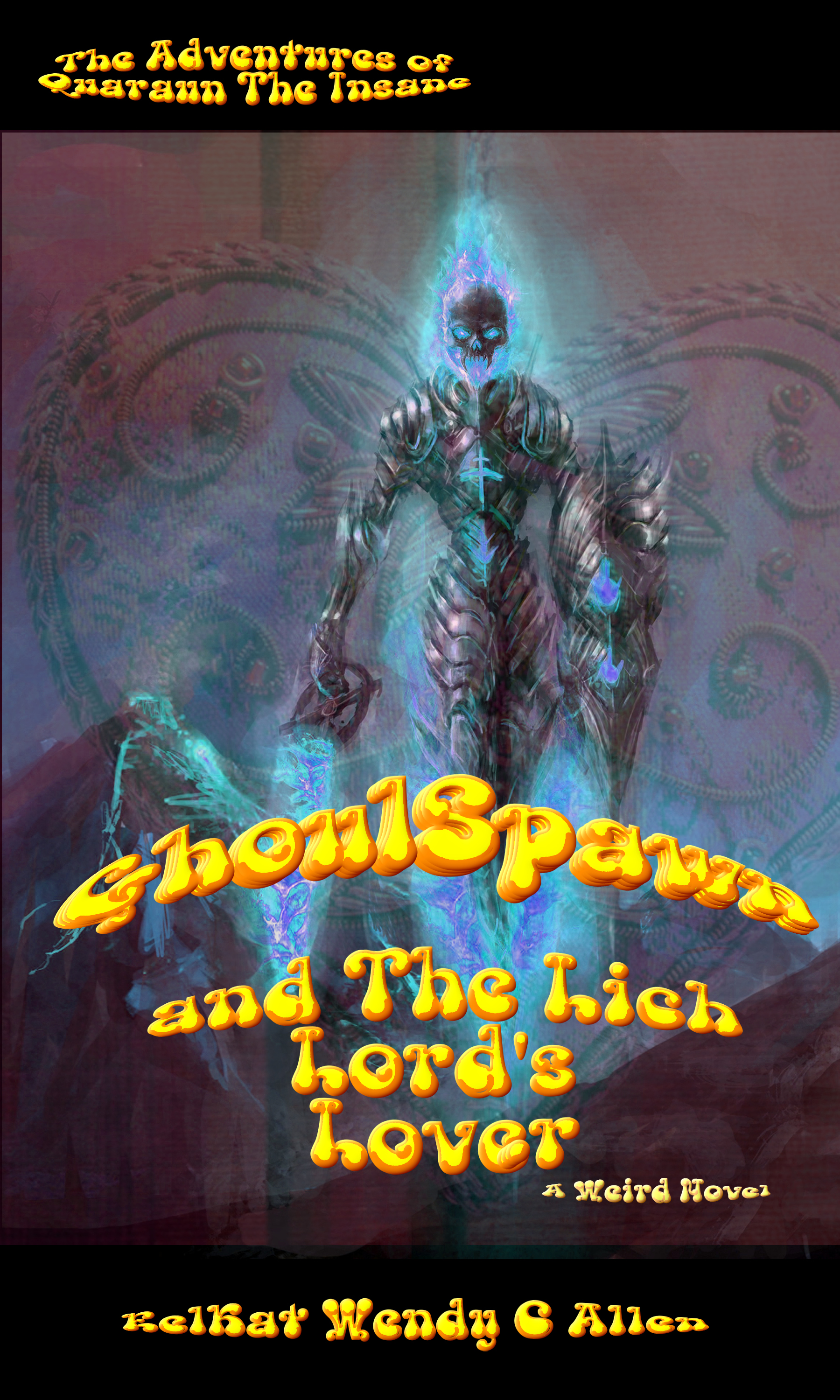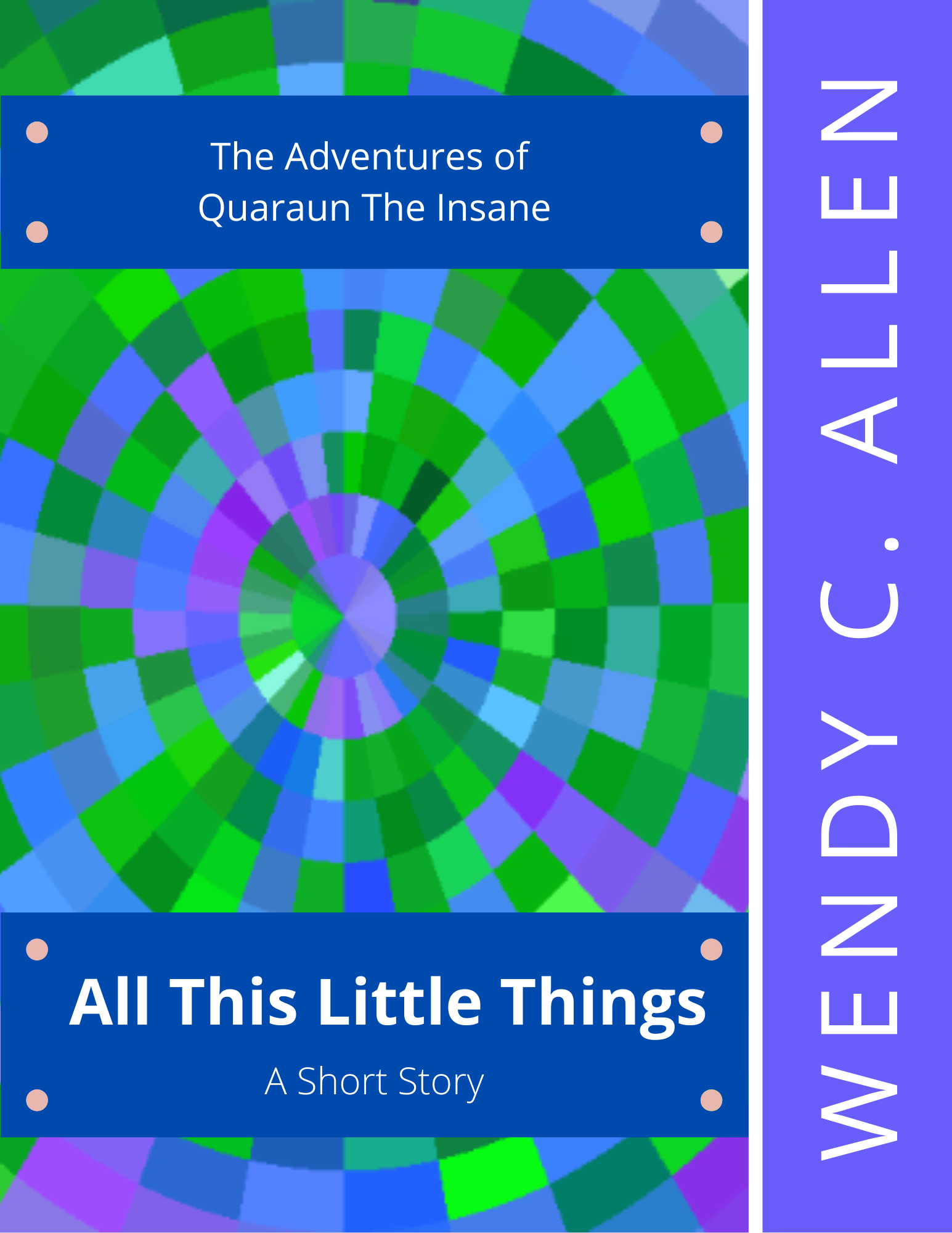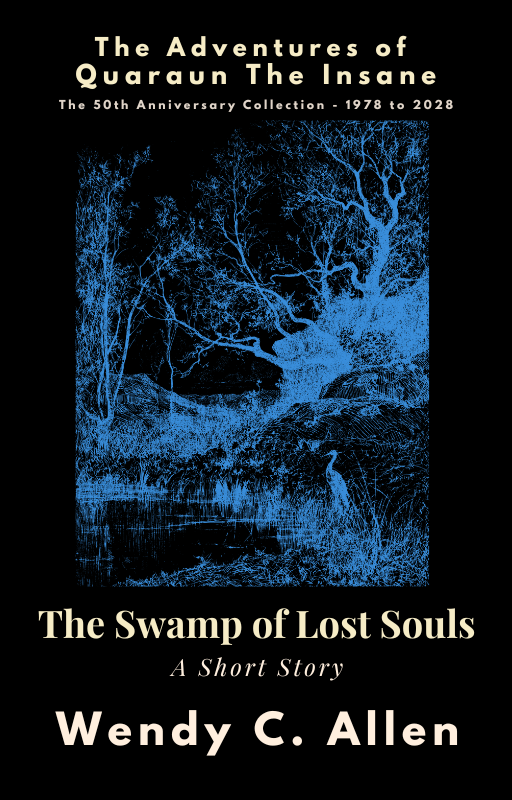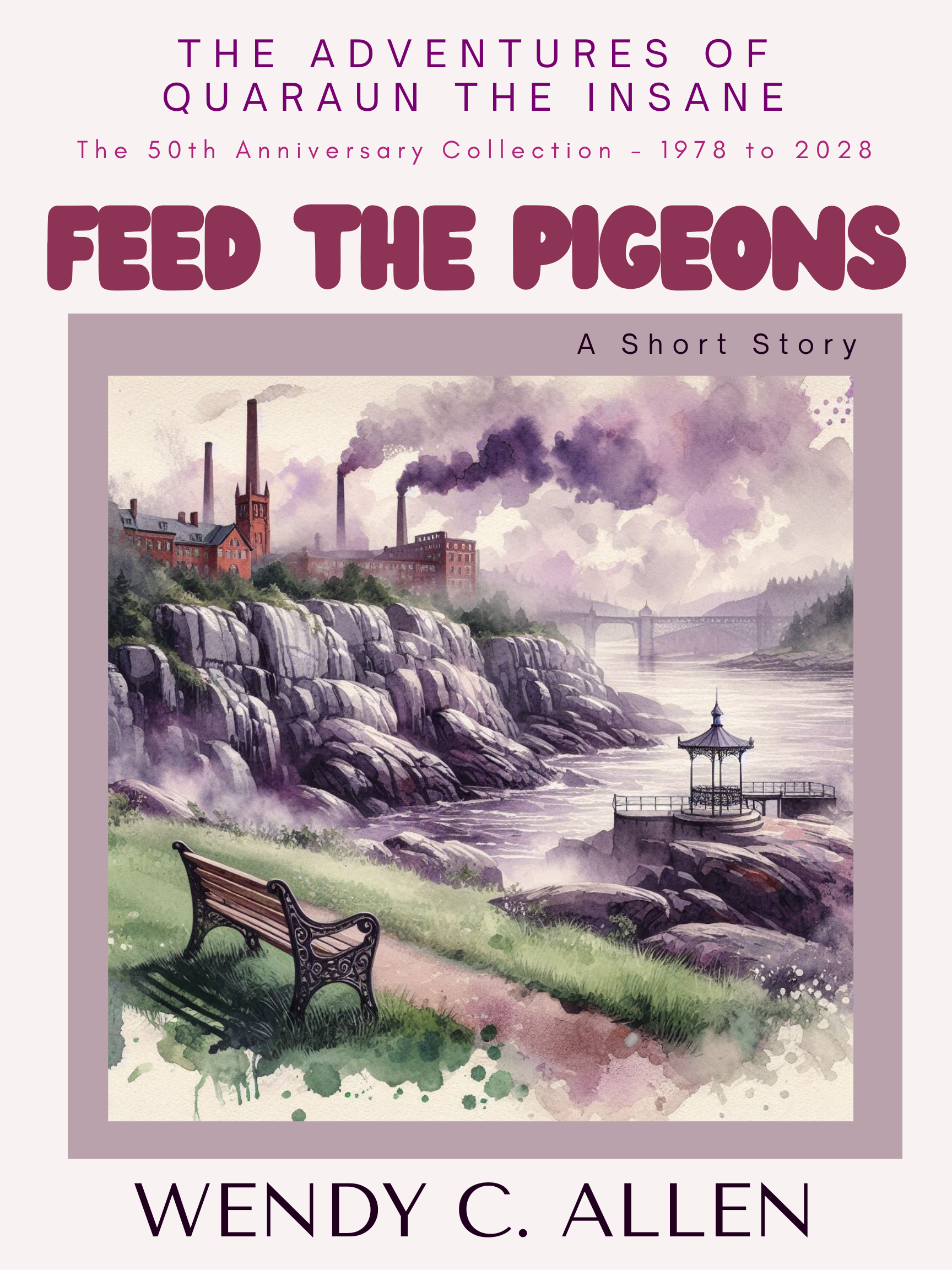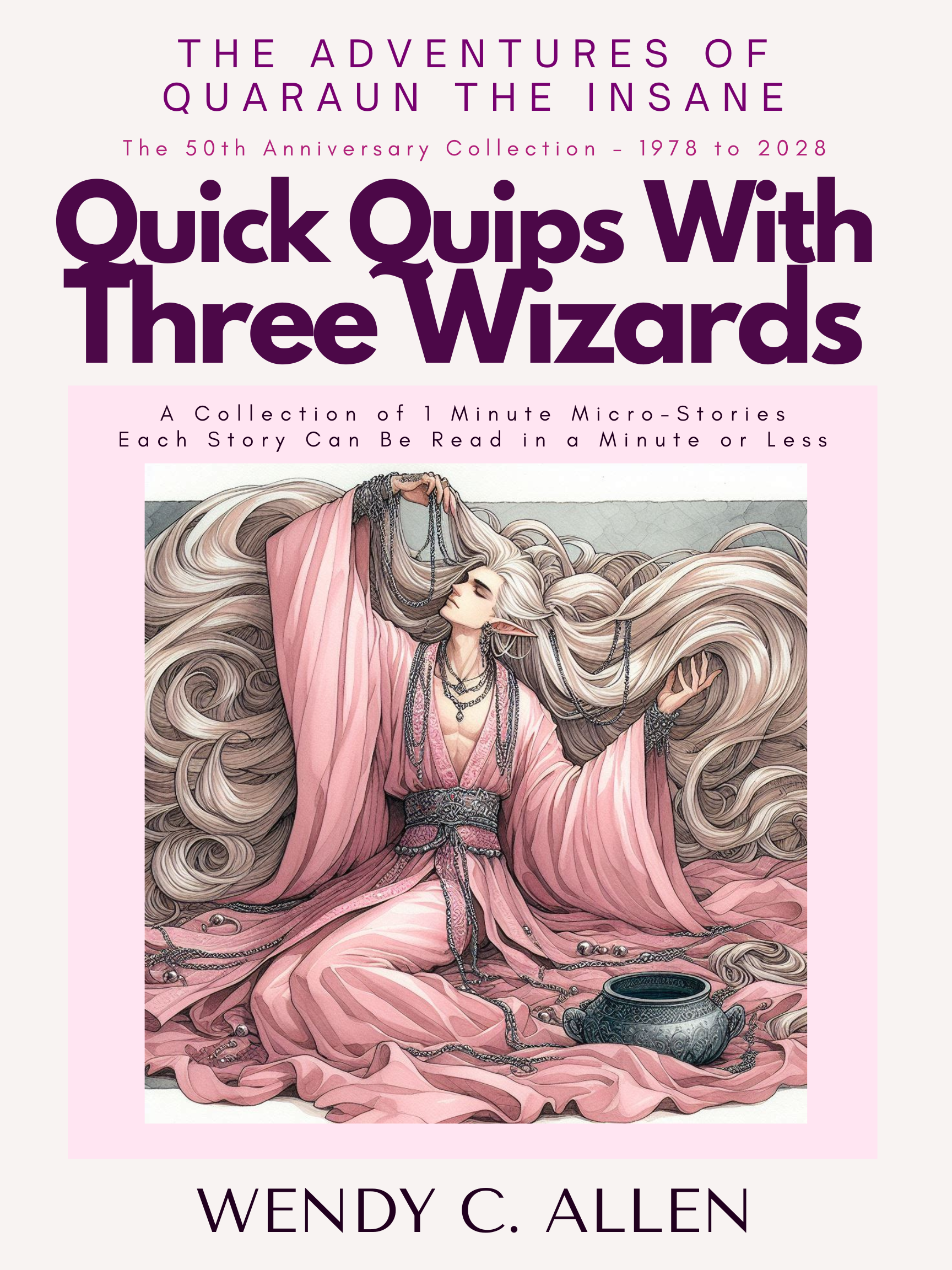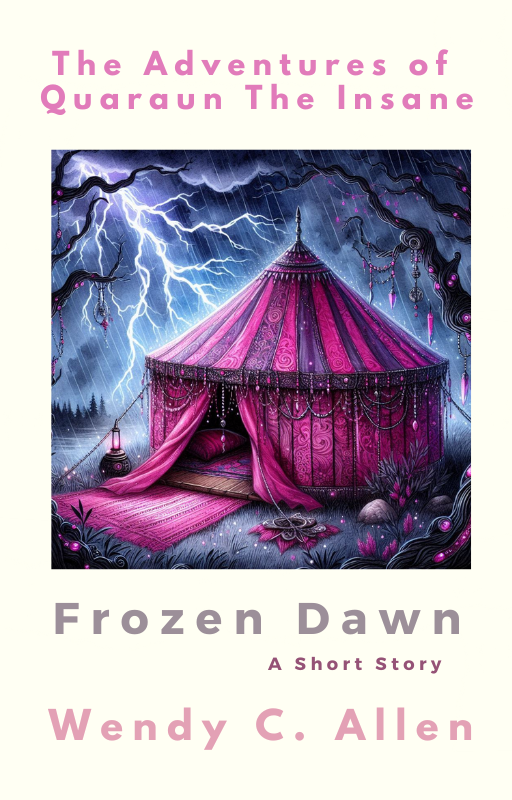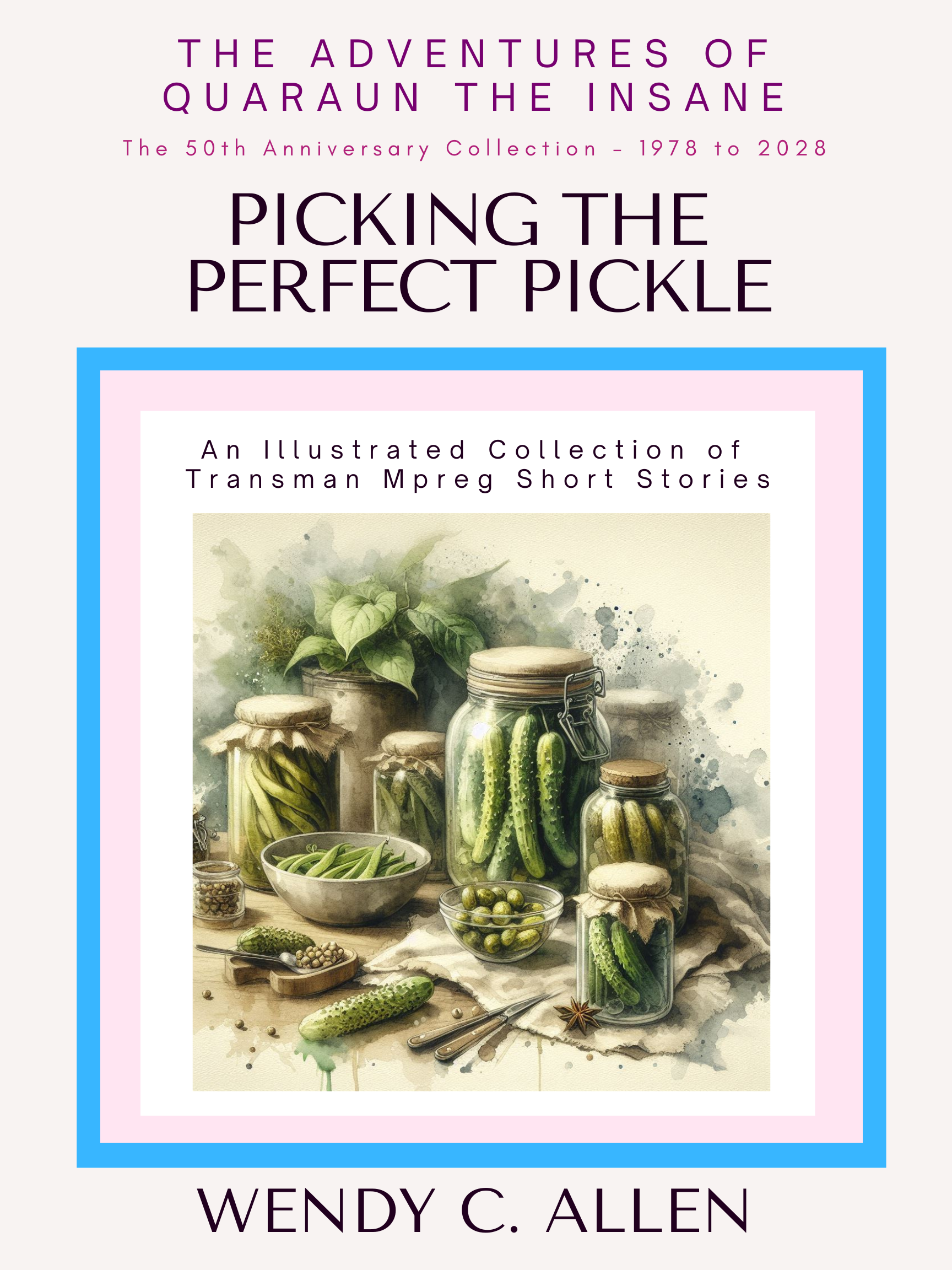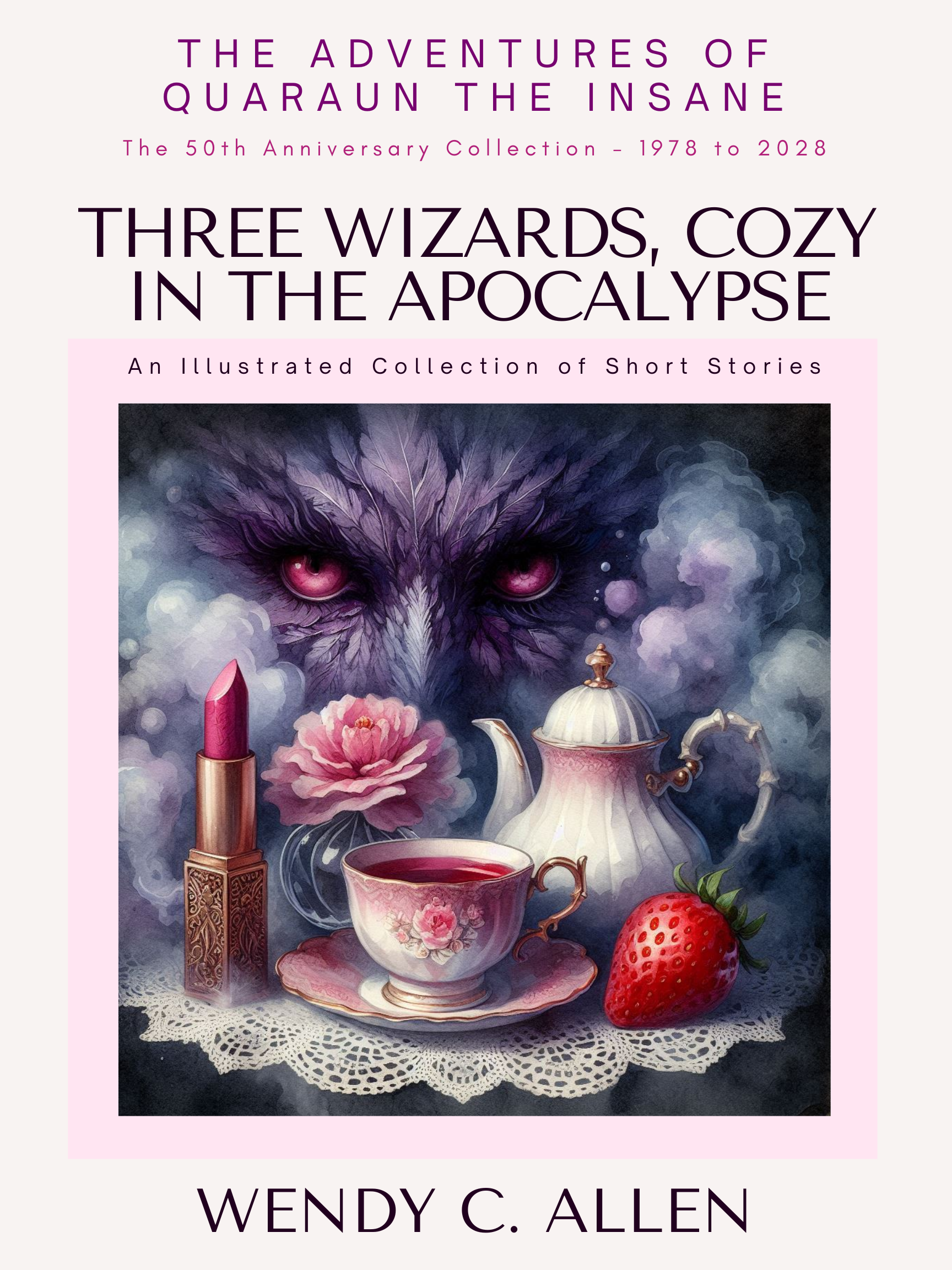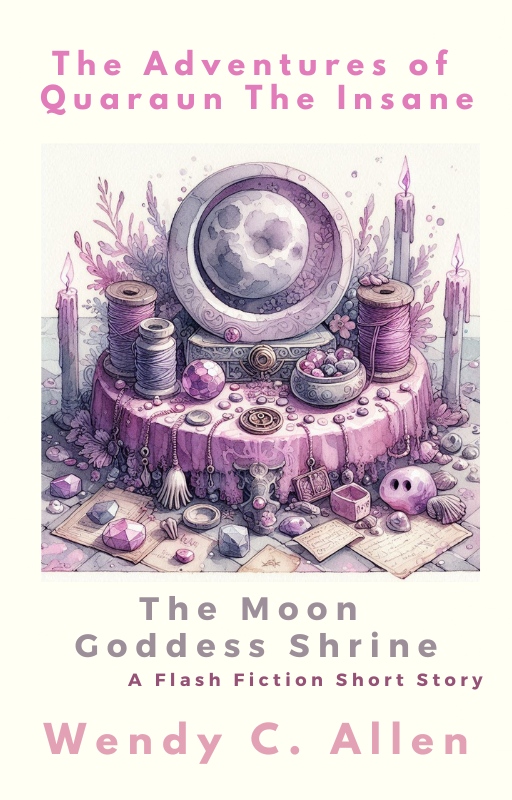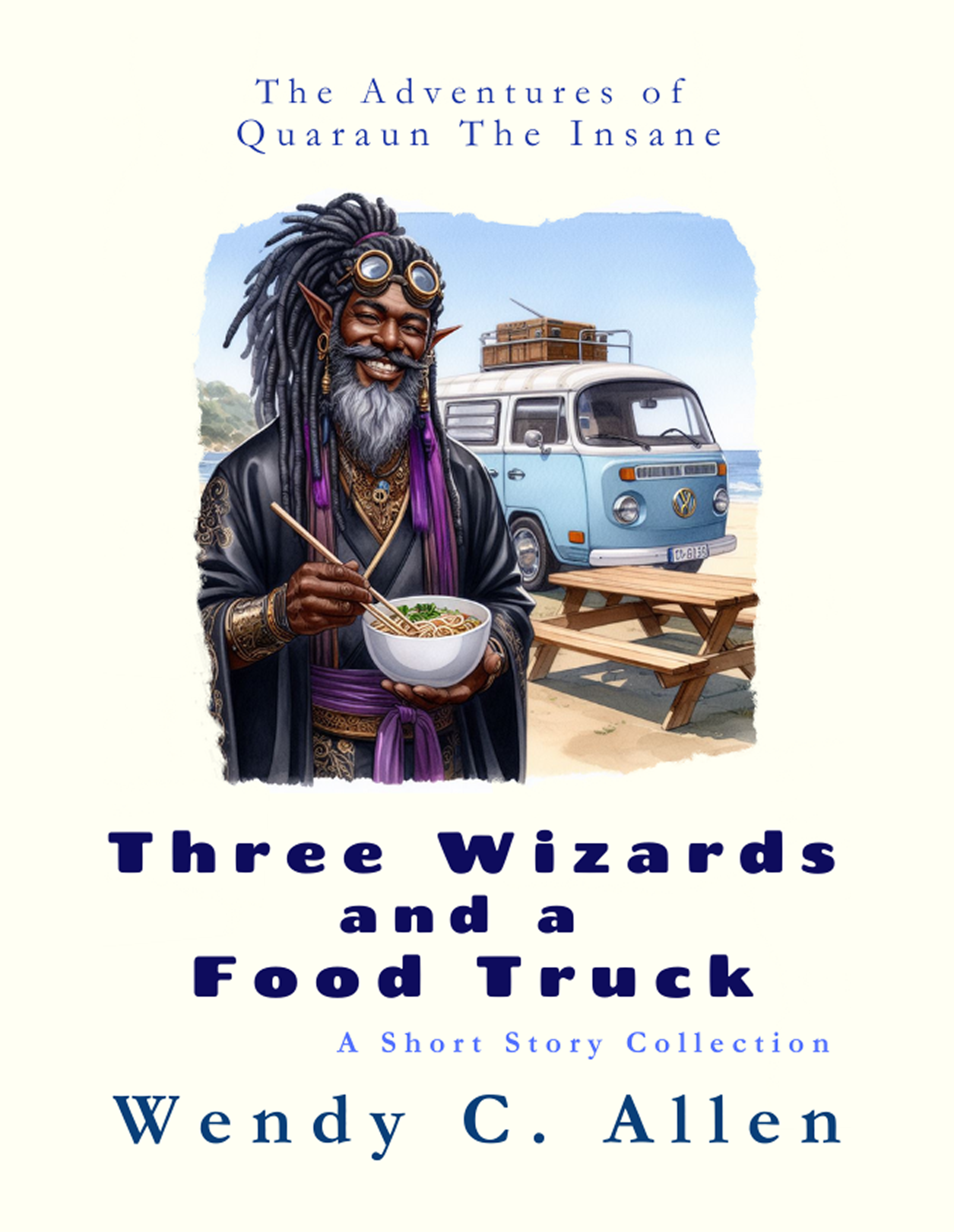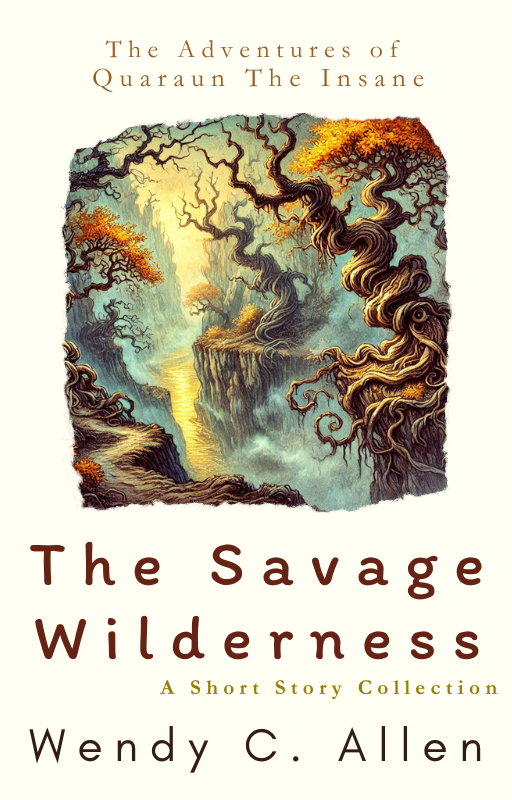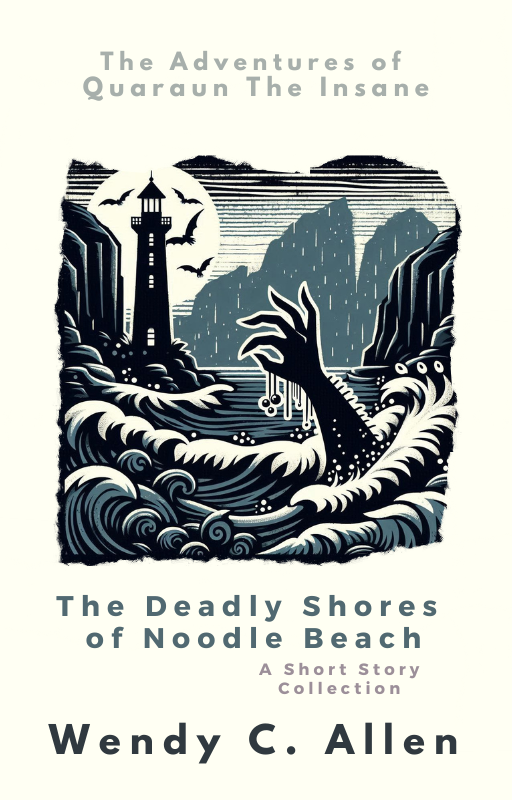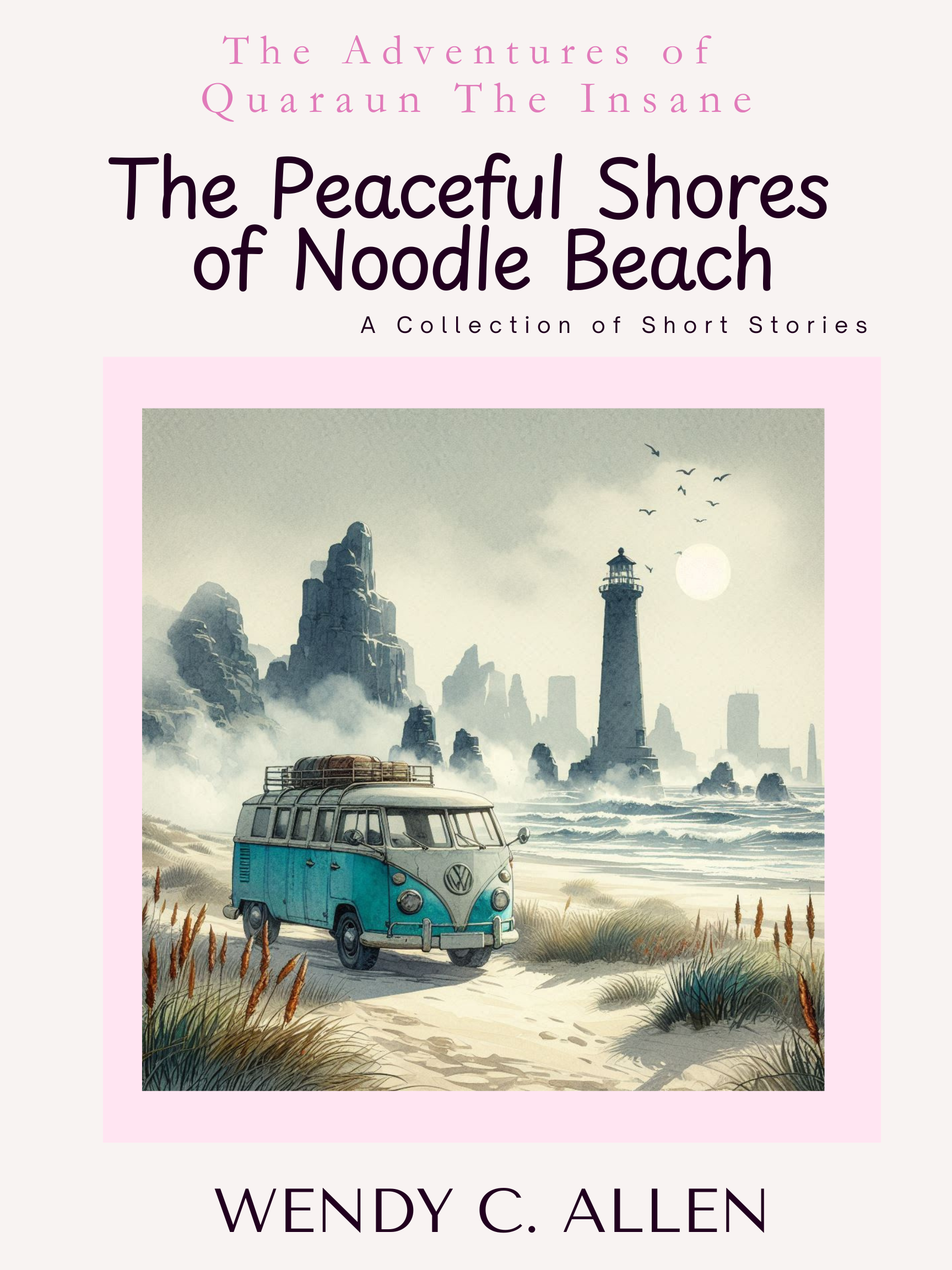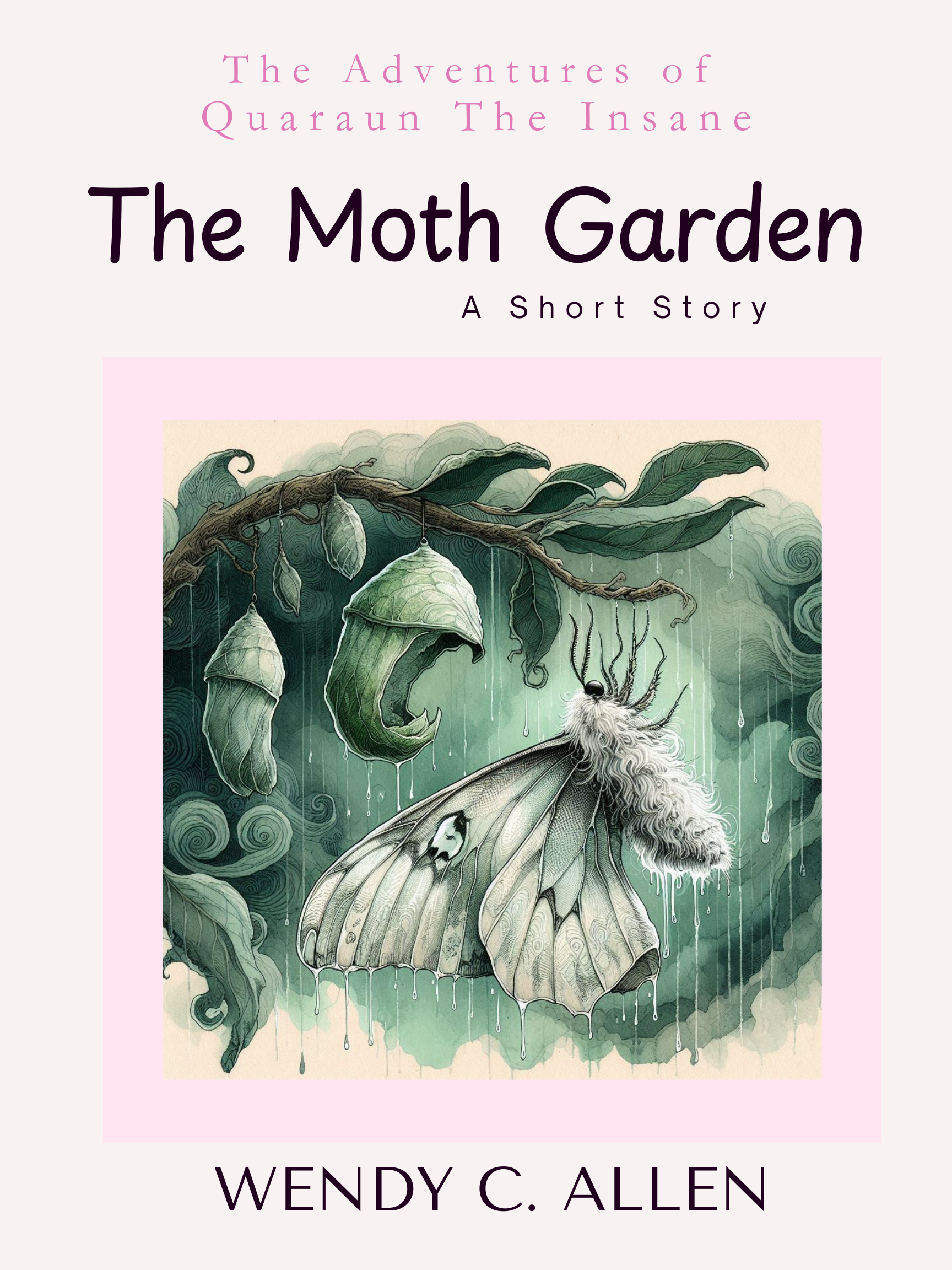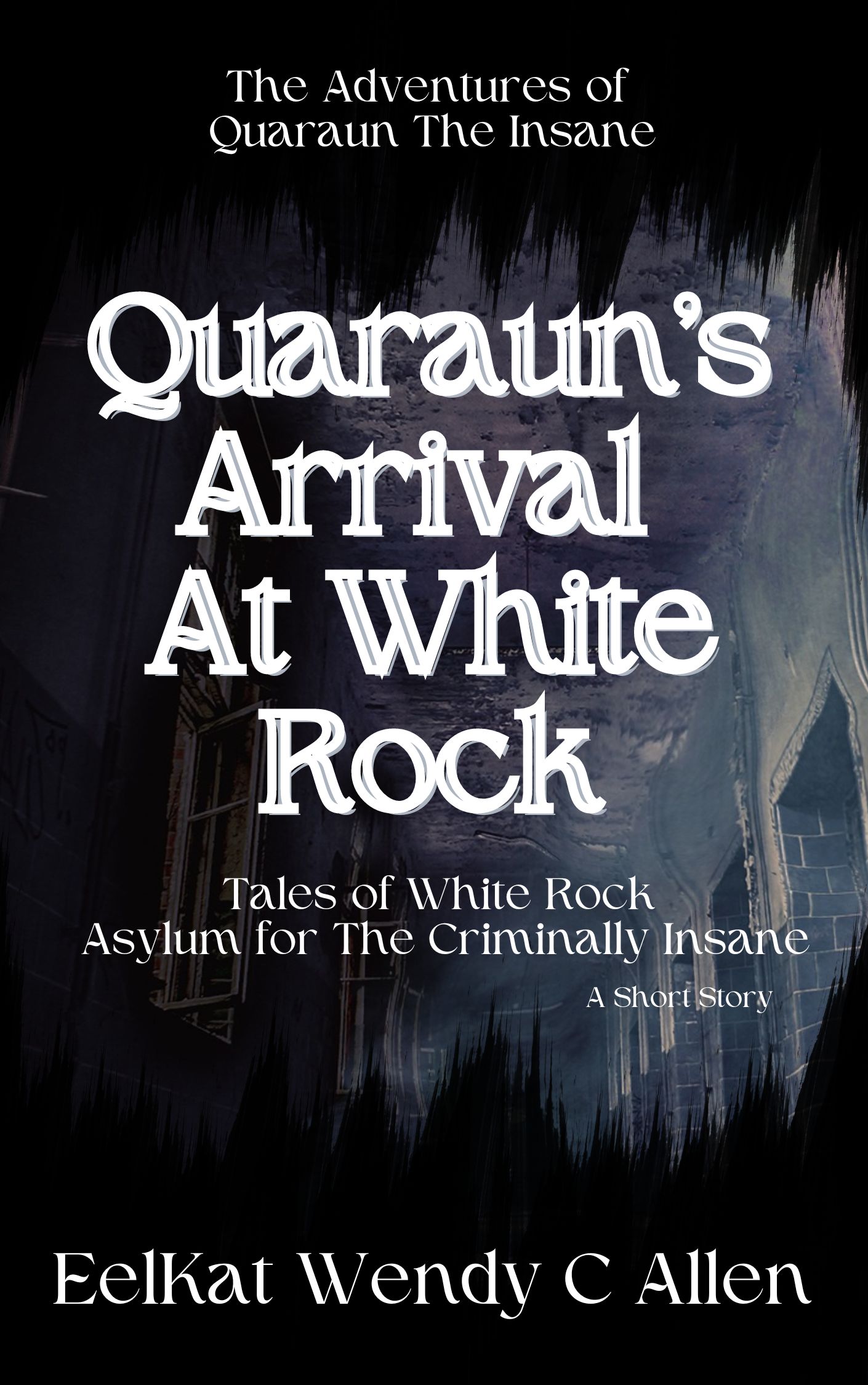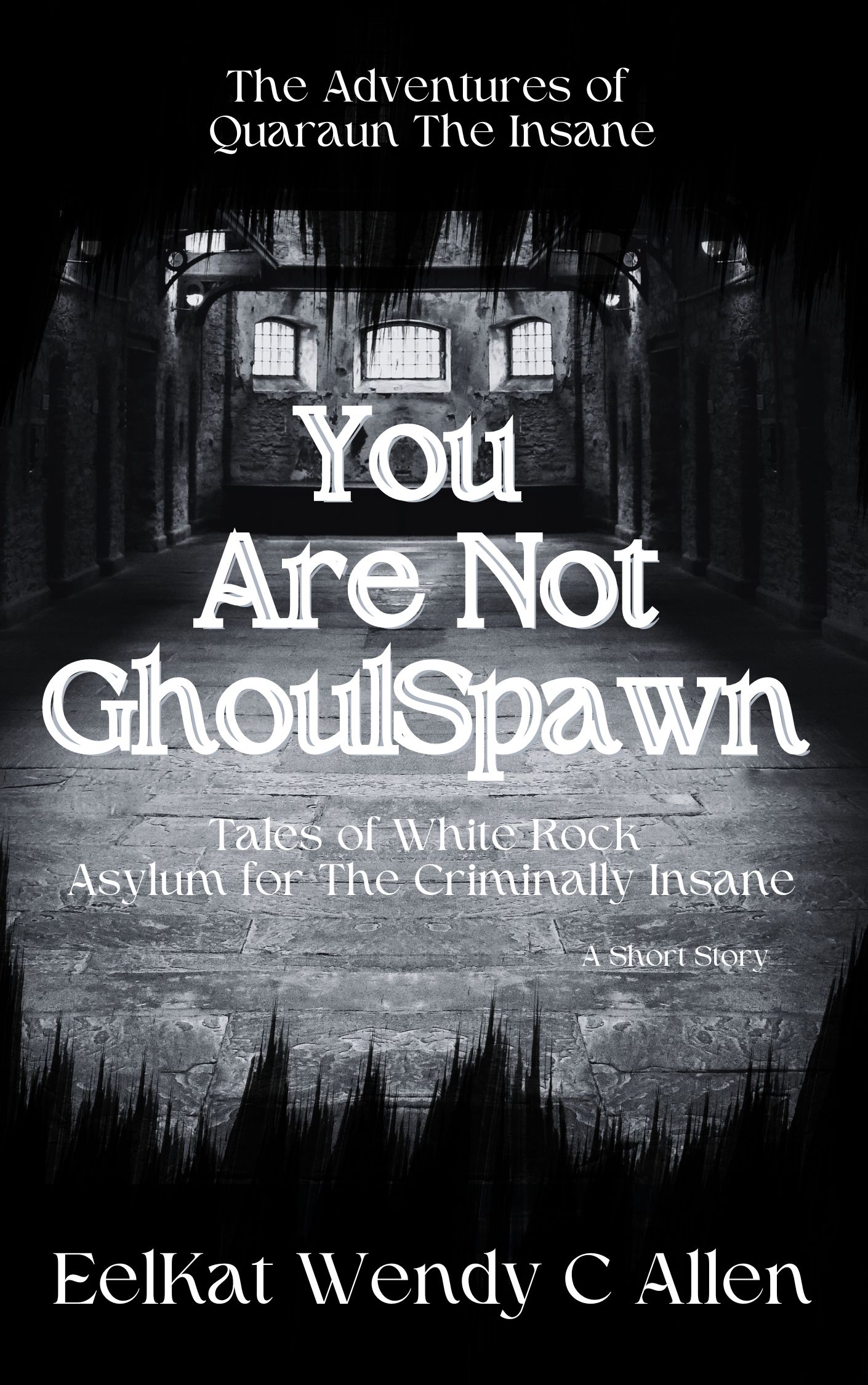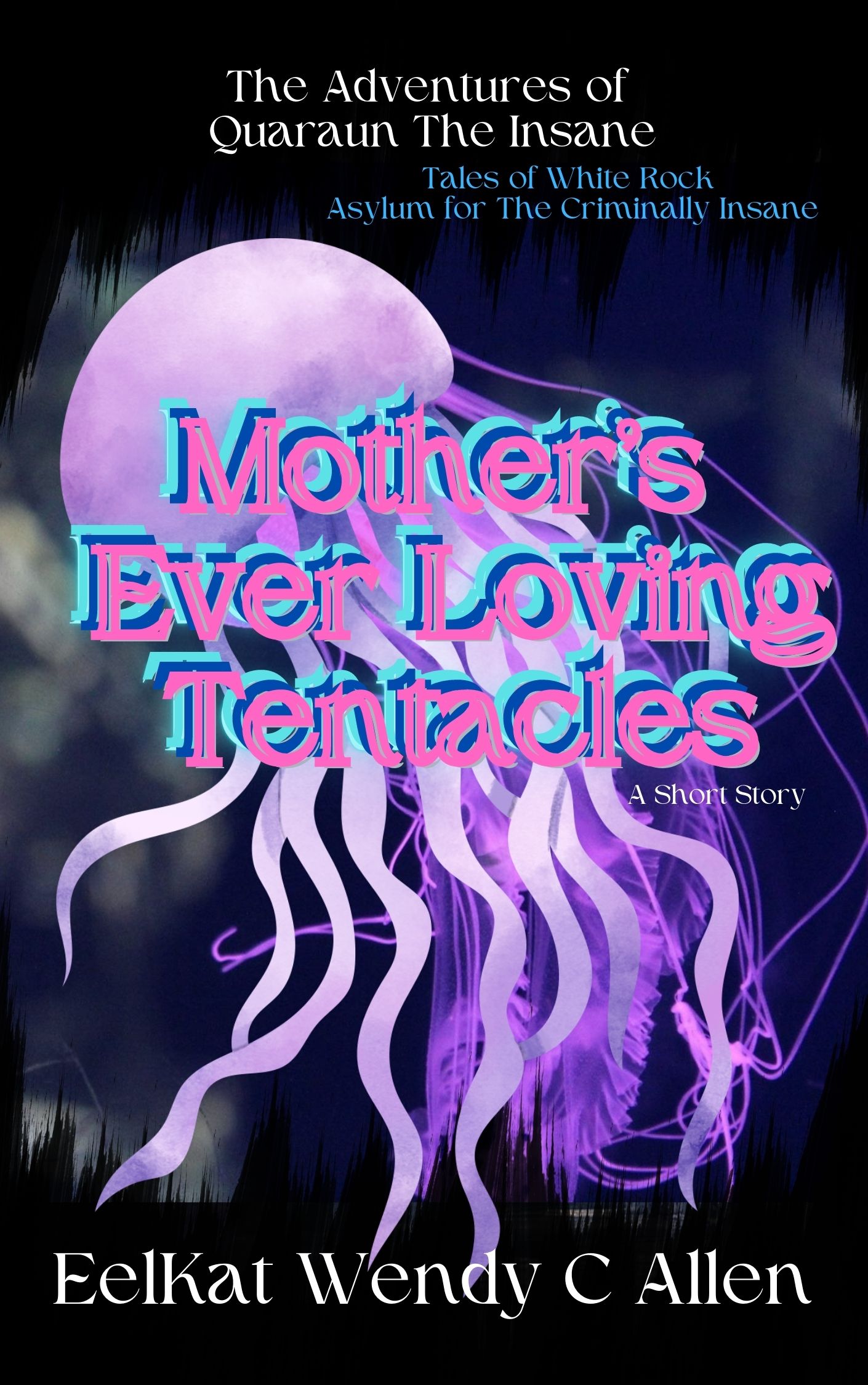Counting Down to the 2028 50th Anniversary of my first published book (September 23, 1978)
|
I am an author. I write Yaoi. This is my website. Yaoi means my main characters are gay lovers. If that bothers you, you're on the wrong website. Sorry.  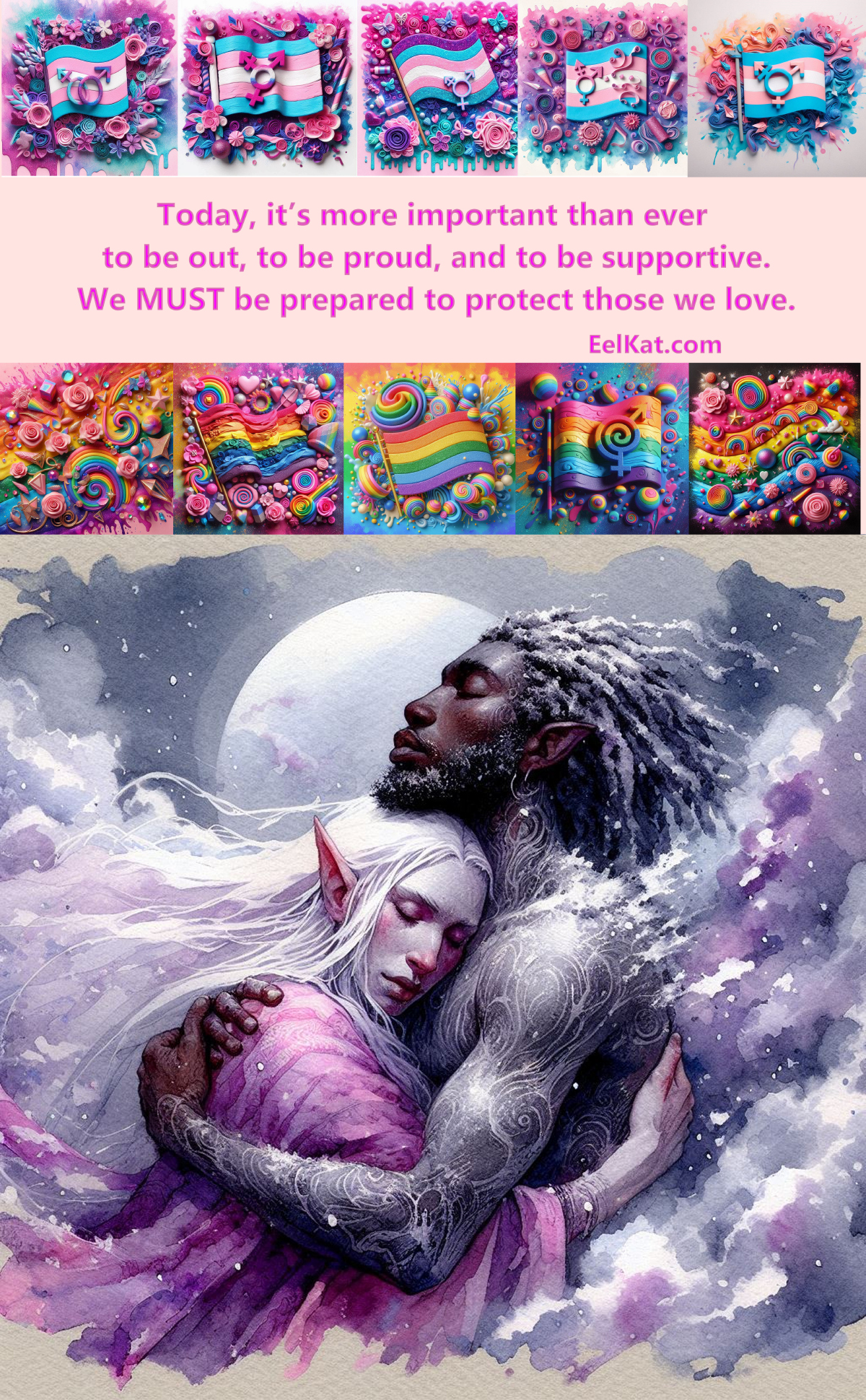 Transman Quaraun (The Pink Necromancer) and his husband King Gwallmaic (aka BoomFuzzy the Unicorn) King of The UnSeelie Court. Main characters of The Adventures of The Pink Necromancer series. Transman Quaraun (The Pink Necromancer) and his husband King Gwallmaic (aka BoomFuzzy the Unicorn) King of The UnSeelie Court. Main characters of The Adventures of The Pink Necromancer series.
|
This website is a safe zone for LGBTQAI+, pagans, polys, trans, neurodivergent, disabled, mobile aid user, minority, cosplayers, otherkin, furries, & BIOPIC communities.
If you are a hater, you can go fuck yourself.
Happy 2026!
It is our 30th anniversary here at Space Dock 13!
On the web since 1996!
You have encountered an extremely old website that continues to exist in old web ways, the same way it has done for now three decades.
In spite of being now 30 years old this year, started in 1996, it is still heavily active and old pages updated daily, new pages added daily, still now in 2026. All hand written, all hand coded (no AI), all by me, same as it ever was.
We Still Exist: The Old Web Did Not Go Away, You Just Forgot How To Find Us
|
This site was NOT designed for mobile devices (as they had not been invented yet when I created it) thus this site looks best on a computer, at 1280x768 or above. |
This is a very old website created in 1996, so, yes, javascript is needed for the site to work as it should. If things don't function, you may need to update javascript drivers on your device |
This site tries to be mobile friendly but it's been online since 1996, so old pages may not load right on mobile devices, and as this site has had pages added near daily for 30 years there are now over 20k pages here. |
Having started out in life as a GeoCities site, this site contains glitter, bright colours, blinkies, moving gifs, and other things the old web was known for. |
Just Write... Is it really so hard to do?
An Alternative Approach to "Just Write"
An Alternative Approach to "Just Write" (self.writing)
submitted 6 hours ago * by Manjo819
Also if you hate starting from page 1 try the Snowflake Method [https://proactivewriter.com/blog/see-how-easily-you-can-write-a-novel-using-the-snowflake-method] or something comparable.
I've seen a lot of posts here asking for more specific advice than 'just write' and the response has most often been 'just write, dude'. I've explained why I think people give this advice above and you're not wrong. This is just an alternative approach.
I am not under the illusion that I wrote this well.
TL;DR: Just Write means doing more than just scrawling on paper, it helps to have specific considerations, whether overt or instinctual, that shape your writing as it comes out. As you get more comfortable considering and scrawling at the same time, your definition of 'just writing' will expand.
>>>I have no credentials.
Nor do you need any. And I'm sorry that other writers make you feel like you do. But I understand why you add this point at the start. The internet is hostile and full of ego and sadly, many online writing communities are flooded with highly competitive toxicity and are prone to attack anyone who isn't trade published.
>>>I've struggled with the advice to "Just Write" for a long time, and have recently found more success with it.
I think the concept of "Just Write" works best when someone has first had some practice in a offline writing group, such as a college class for Creative Writing.
"Just write" is good advice, but, I think too it could be wasted advice on new writers who are lost and confused and unsure of their writing ability.
"Just writing" takes a bit of self confidence, and in my experience, a lot of new writers don't have any self confidence at all, that's why they waste so much time looking for critiques, feedback, and reviews.
>>>I'd like to share my perspective.
I wish more people world. I'm glad that you did.
>>>When a seasoned author receives questions on how to improve productivity, it makes a lot of sense for them to recommend 'just writing'. They have practice constructing passages. They have an idea, whether through training or instinct, of what goes into a good opening sentence, what kind of arc a passage wants to take, how soon the setting needs to be described. To such people 'just writing' is an action comprising much more than simply putting pen to paper.
This is true, BUT... everyone started some where, and look at me. I didn't go to school. I had to training. I simply wrote. If you look at my older works, my grammar was horrific, my spelling barely legible.
Most of us are not these people.
>>>I tried and failed recently to teach my younger sibling to drive. I wanted to start her off with what to me was a single easy movement from one parking space to the next. To her, of course, this meant foot on the clutch (left pedal), stick into first gear (top left), foot on accelerator (but just the right amount), slowly release clutch, try not to shit yourself at that jerk you weren't expecting, keep pressure on pedals uniform, foot on clutch again, apply brakes (but gently). Beyond the difficulty of trying to hold all these steps in her head, she hadn't yet been told what they were, nor how many.
I was 37 when I first learned to drive. I learned to read and write a year later. Got my GED a year after that. And didn't start college until I was in my 40s.
Feral child.
>>>If you've ever sat down to just write and found yourself staring at that smug little blinking line wondering where the feck to start, you can probably understand how she felt. The thing is that as with driving a manual you don't need to learn where to start solely by trial and error. You can watch how other people do it, you can ask them, or you can google it.
Blinking line?
Do you mean computer?
I write with pen and ink on paper.
>>>The allegory of the driving lesson ends here as there is only one way (to my knowledge) to drive a car. The question of how to 'just write' can't be answered as specifically. Everyone is going to have a different process. What I would like to propose, though, is that 'just writing' is significantly less futile if you equip yourself with some idea of what your process is going to be.
You have used several words I do not know. It makes it difficult for me to understand everything you are saying here. I will look them up later.
>>>Let's focus on the first couple dozen characters behind that smug blinking line: Let's take a look at your opening sentence:
>>>>"'People are afraid to merge on freeways in Los Angeles'" (Less Than Zero)
>>>This is a fairly straightforward example of an opening sentence that performs at least the triple function of introducing theme (fear, disconnection), characterising setting (LA as urban metropolis, rather than beach-side paradise for example) and initiating action (it's the beginning of a conversation).
I find your method of dissection of sentences interesting. And confusing. I published my first novel in 1978. Since than I have published 138 novels, 30 non-fiction books, 2,000+ short stories, a dozen plays, a few comic book scripts for Disney's Uncle Scrooge and Donald Duck comics, a few dozen novellas, and 10,000+ non-fiction articles.
...and I have never sat down and thought out the functions of any sentences, first sentences or otherwise. I'm wondering, WHY you would do this?
Is not the purpose of a story to tell a story?
When you sit by the campfire and tell a story out loud, do you analyze everything before you say it?
Why are you analysing so much. Why can't you just tell the story same as if you were saying out loud?
Is story telling really that difficult?
You tell a story.
And when you want to publish it, you just write it down exactly the same way you told it.
Why is that so hard to understand?

>>>Do you want to introduce theme, setting and action in your own opening sentence?
Uhm... no. Why would I?
Storytelling isn't about themes or settings or action. It's about entertaining. Making people laugh or smile or scared or cry, depending on the genre.
I've never once sat down to write and asked myself:
* "What theme is this story going to have?"
* "What setting is this story going to have?"
* "What action is this story going to have?"
Why would I?
I find what you say to be very confusing.
I think that you are definitely over thinking the writing process way too much.
>>>If yes, were you thinking about it last time you sat down to 'just write'?
No.
I wasn't.
I never have.
I'm not writing a non-fiction book that requires technical data, research, and themes. I'm telling a story, not writing a presentation.
I don't think you have any clue what "Just Write" even means.
You have a story in your head. Write it down.
When dealing with first drafts: structure is unimportant, grammar is meaningless, spelling doesn't matter. You can fix those things later. You can hire editors and proof readers to find the errors and show you watch needs fixing.
You are the storyteller, the creator of dreams. None of the technical stuff matters at all.
**JUST TELL THE DAMNED FUCKING STORY ALREADY! WHAT IS SO HARD ABOUT THAT? WHY CAN NO ONE UNDERSTAND THAT THAT IS WHAT JUST WRITE MEANS!?!?**
>>>You don't have to have this specific idea in mind to do so, but you'll get a lot further if you have an idea in general. Acquiring these ideas can be difficult, there aren't many people who'll stop you in the street to talk about how the opening passage of Fight Club (deliberately or not) compounds the 'narrative vertigo' effect of In Medias Res with the literal vertigo of leaning over the edge of a building to achieve the overall effect of 'really throwing you into the action'.
What the fuck are you even talking about?
I think I'm starting to understand why you say "Just Write" never worked for you. I don't think you have a fucking clue how to tell a story.
You're one of those people who chops up a novel looking for hiding meanings and cryptic codes, messages from god, and secret Easter eggs the author MUST have put in if you take every 333rd letter and form a word with them.
When you have an idea, you write it down.
When you want to tell a story, you write it down.
You don't sit their thinking "Now what word should I use to convey this cryptic hidden meaning that only mega high IQ jackasses are going to figure out I hid in here?"
No wonder you have so much trouble just writing.
You are doing way too much overthinking here.
>>>If you have trouble starting to write from nothing, try in a timely fashion to figure out some guidelines so that you're not really starting from nothing. A little planning goes a long way, though in the 'just write' spirit I do mean a little.
Again. I'm confused. What the fuck are you even talking about?
Why would you start writing from nothing?
Do people do that?
I couldn't imagine trying to write that way.
Isn't the whole point of being a writer, is that you ALREAD HAVE SOMETHING that you want to say?
You write because you have a story floating around in your head and you just have to write in order to get it on paper.
If you waste all your time worrying about technique and structure and grammar and hidden messages, you'll just end up forgetting what the story is that you wanted to tell.
Why would you start from nothing?
If you have a story you want to tell, that is NOT starting with nothing. The story is something. Just tell it.
>>>A lot of basic ideas about what you want you could answer yourself, if only you were asked the right questions. I would recommend asking yourself what you want to do with, among other things, your:
>>>>>First chapter (eg. introduce main character, describe his living situation, hint at motivations for his coming actions so they seem believable)
Uhm... why would you do this?
I don't think a character would be believable to me if he started tossing out hints to his motivations. People don't talk or act like that in real life so why would they in a book?
>>>A lot of basic ideas about what you want you could answer yourself, if only you were asked the right questions. I would recommend asking yourself what you want to do with, among other things, your:
>>>>>First paragraph (eg. you want a progression from A to B within chapter 1, so you show the audience what point A is)
Again, why would you do this?
You have such a strange method of writing.
I suppose it's all well and good if it works for you, but damn, I'd never be able to write this way.
I just write the story down, I don't try to analyze it and fill it full of themes and hidden meanings. That's so weird that you would do that.
Perhaps it's because we write different genres?
Does everyone in your genre write this way?
>>>A lot of basic ideas about what you want you could answer yourself, if only you were asked the right questions. I would recommend asking yourself what you want to do with, among other things, your:
>>>>>Opening sentence (eg. introduce main theme, convey main character's dissatisfaction with his job as a freight sorter, provide a basis for the point A you will elaborate on in the rest of the paragraph)
Still wondering, why would you do this?
I've never done this.
>>>A lot of basic ideas about what you want you could answer yourself, if only you were asked the right questions. I would recommend asking yourself what you want to do with, among other things, your:
>>>>>General theme/topic of discussion (your book is about grim perseverance, so in your opening sentence he's moving grumpily forward against some wind or some shit)
I'm very confused. Are you actually suggesting that there are authors who do this? Why would they?
I have never had a theme or a topic of discussion, not once in any of my novels, short stories, or stage plays.
I just tell the story.
I don't think you know how to tell a story.
>>>A lot of basic ideas about what you want you could answer yourself, if only you were asked the right questions. I would recommend asking yourself what you want to do with, among other things, your:
>>>>>Character development (where do they start, where do they end, how do they get there, how do I show each of the above?)
I've never done this. My characters exist in some dimension in my head and I write them down as they want to be written. I didn't developed them. They were just there.
Quaraun lives out his life every day in my head, wither I write it down or not. I prefer to write down everything as he does it, thus why I write every day, so that I don't miss anything. I miss the things he does when I'm sleeping and when I'm busy. Which is why stories end up with blank spaces.
And when readers ask "What happened in between?" I just say "I don't know" because I didn't see what happened, I was sleeping or busy and couldn't pay attention to what he was doing to write it all down, so stuff gets missed sometimes.
>>>A lot of basic ideas about what you want you could answer yourself, if only you were asked the right questions. I would recommend asking yourself what you want to do with, among other things, your:
>>>>>Style (eg. you you hate it terribly when adverbs are used copiously and redundantly, so you substitute words that combine both intended meanings eg. ran angrily -> charged)
You know... I don't know what an adverb is, so I wouldn't know if I was using too many or not enough.
I write exactly the same way as I talk.
I don't try to structure or format or style things.
If you talk to me in person, face to face, what you hear is exactly the same thing as you read when I write.
Also, you love big words. Again, there are several word you are using here that, I don't know what they are, how to say them, or what they mean. I'll add them to the list of words to look up.
>>>Once you have a few criteria in mind the task of 'just writing' becomes a whole lot less obscure.
Why do you need any of this "criteria" as you put it?
If you saw a car accident on the way home from work, you would just run into the house and tell your wife what you saw, exactly the way you saw it. You straight up tell her the story of the car accident you saw. You don't stand on the porch building a theme, creating a style, choosing less adverbs, developing characters, picking your first sentence, designing your paragraph themes... NO! Of course not!
You just burst through the front door and blurt out what you saw.
You tell your wife the story of what you saw on the way home from work.
You don't plot, you don't plan, you just tell her. You are bursting and bubbling with energy, you've got to tell someone what you saw, and you just blurt it out.
Writing a story is the same thing.
Suppose you decide to write a story about the car accident you saw.
All you have to do, is sit down, and rite out exactly what you saw. You just write the story the exact same way you bubbled it out to your wife.
You don't worry about sentences, paragraphs, characters, or adverbs. No! You tell the story, with the exact same excitement and gusto you used when telling it verbally to your wife.
Why is the concept of Just Writing so difficult to understand?
>>>The words "Just Write" fit into all this in the sense that if you spend your whole time deciding what you want to say, you will never actually say anything.
Again, I'm confused. If you are telling a story, why would you need to decide what to say? You already know what to saw. Just say it.
I do not understand what you are talking about. I can't even wrap my mind around it.
Yes, you will never write anything if you spend hours deciding what to say, but why wouldn't you know what to say?
>>>If finding the perfect criteria for your opening sentence is going to take ten non-consecutive hours of brainstorming, then just find a single criterion and make a sentence around it.
You are telling a story not writing an essay for a college exam. You don't need to decide on a sentence.
Why would you waste time deciding on a sentence? Do you actually do that when you are talking face to face with someone?
Damn! You'd not be very fun or interesting to talk to if you made me wait 10 hours while you formulated a sentence before you said it.
Just write what you say. It really is that easy.
I write on average 25k words a day this way. My biggest one day word count was 73k words but I got no sleep that day and it was during NaNoWriMo, the year I did 500k words instead of 50k words. 50k isn't a challenge for me, I write that much every week end all year round anyways.
You know how to talk.
You know how to have a conversation.
Just write your story exactly the same way you would tell it if you were talking to your best friend over pizza. You'll have the whole novel finished in 2 days.
>>>If you can't figure out what should happen between paragraph 1 and paragraph 3, write 1 and 3 and think about what's missing to get from one to the other.
>>>"Just Write" means that whatever else you are doing, if you are not applying pen to paper you are doing it wrong.
Wow! What dictionary are you using?
You really don't know what "Just write" means do you?
Well, I got to say, I've never seen a take quit like yours, but if it works for you, than more power to you.
You know, I think you are completely over thinking the meaning of "Just write".
Just write means EXACTLY that.
**JUST WRITE**
Only this and nothing more.
STOP THINKING AND WRITE!
STOP ANILYZING AND WRITE!!
STOP WORRYING AND WRITE!!!
JUST
FUCKING
WRITE!!!!
It DOES NOT mean you have a plot in mind or any clue what to write.
It means, you sit ass in chair and write the very first thing that pops into your head no matter what it is. Write what your desk looks like, write about your neighbours who won't stop yelling all night long, write about that annoying crack in the wall that is distracting you... just write.
It's known as "free writing". The idea is to write lots of nothing about anything and everything, to loosen up your brain, and get all the emotional blocks out of the way.
THIS is what authors mean when they say "just write". I can't even begin to imagine how it is you translated it to mean anything else.
It's a type of exercise. You wouldn't play football without doing warm up exercises would you? Writing is the same way. I don't know of any professionally published writer who doesn't do daily free-writing warm up sessions before getting to work of whatever assignment they are supposed to be doing.
In most cases after you've done this for a couple of hours, you find yourself taking what you are writing and subconsciously turning it into a story. A story you had not planed or prepared, but rather a story you didn't know you had in you.
Scrawling empty nothings on the page is EXACTLY what "just write" means.
I've never started out with a plot. Never knew where the story was going to go.
Have you looked into a thing called "beat sheets". It sounds like that's the sort of writing method you are looking for. Beat Sheets are fill-in-the-blank outlines, that are similar to the mad libs game, but designed for novelists. They are usually about 10 pages long, 1 page for each chapter and are used as a jumping off point for people who need some sort of guidance to write.
If you go to Harlequin's site, they have beat sheets listed for each of their book lines, because in Romance authors are required to stick to a strict formula (thus why it's called formula writing - character MUST do this on page 8, and MUST do that on page 24, and this must happen then, etc) Beat sheets are how Harlequin authors publish a new novel every single month like clockwork. Formula writing with beat sheets gets pretty easy if you do it a few times and get the hang of it. Barbara Cartland used beat sheets and she published 801 novels before she died. (she has the Guinness World Record for the most novels published by any one person).
There's an example of beat sheets used for Monster Porn short stories here: https://www.eelkat.com/writing-monster-porn-beat-sheets.html I use them when writing short horror stories because it helps me keep the story under a certain word count by keeping the characters on track and not letting the story wander off on it's own. That sort of thing might help you out if free writing is too loose a method.
Another beat sheet I've used is the one by Jami Gold, here: https://jamigold.com/2012/11/write-romance-get-your-beat-sheet-here/
My favourite beat sheet is the Lester Dent one from the 1930s: http://www.paper-dragon.com/1939/dent.html
There's others but I can't think of where they are off the top of my head. I had those 3 bookmarked. I had another one bookmarked too, that had 50 beat sheets, but the link goes to a 404 page now and I can't find a replacement page for it, Looks like it got taken down.
When I'm doing the 52 stories in 52 weeks challenge, I've found those beat sheets to be very helpful. Beat sheets is how I've been able to publish a story a week for years. Its why I can just write so many stories without having any plot or characters to start out with. Beat sheets are amazing if you like using that sort of thing. A lot of writers don't like them and call them cheat sheets and won't use them, but most every big name author whose putting out 4 or more books a year uses them. They free up a lot of time and make the writing process go a lot faster and smoother. It's definitely something to look into if you are having trouble getting started on a story, because they are incredibly helpful and keeping the story on track,
For novels, all I do is free write though. No plotting. No planning. No beat sheets. All 130 novels I've published since 1978, not one has ever been pre-planned. All just pure free writing with no clue where the story will go or what's gonna happen next.
I do like the Snowflake method. I'd tried it a few years back. It's sort of a, free association style of writing where you write this and it makes you think of that, so you add that too. Stan Lee said once he used the SnowFlake Method when writing Spiderman.
Some people say building an outline helps. I used to do that decades and decades ago, but I found whenever I outlined the story, I never wrote said story after. It was like I already knew how the book was going to end, so I was not motivated to write. I think of writing as a discovery. It's more like I'm reading WHILE I write, so I never know what is going to be on the next page until after I've written it. Outlines just plain gum up my ability to write so I don't like using them, but perhaps drawing up an outline before you write is the method that'd work better for you?
There's lots of methods of writing, I think all you can do is try each method one at a time until you find the one that is the best fit for you.
Hope that helps. Good luck with it.
Unreasonable Questions, because writers have forgotten to write...
I'm probably the odd one out here, but I actually like reading questions like this, even though I almost never answer them.
Why?
Because they get me thinking.
Like one I just saw, asked about how to write a whip in combat. I didn't answer it, partly because I don't know the answer, and partly because I've never had need to write such a weapon.
But, here's why I liked reading that question. You see, it got me thinking: "How WOULD I write a scene like that?" And it makes me want to test it out, and write a quick story story about a character who carries a whip and give them a combat scene, just to find out if I could write such a scene and how would I do it.
I think of it like a challenge. I can't answer the question because I don't know the answer, but it kind of acts as a writing challenge/prompt, where I challenge myself to try to write something like that.
Back when I was in college, (for my Education Degree focused on teaching High School Literature) I had to take the Creative Writing class and the professor, was constantly giving us these types of questions. "Your character has a ___ and uses it to ___. Write a scene describing how they do it. You have 15 minutes. Go." Than we had to read what we wrote in front of the class. The class was 3 times a week for a little over 3 months, and she started every class with this assignment, before moving into the lesson. By the end of the semester I was in the habit of starting each morning by writing a full short story in a single sitting. And the habit stayed with me to this day.
These were some of the best exercises I ever did as they taught us to think fast, write fast, and write about things we had no idea how to describe, without having any opportunity to research or ask any one else for help. It was great for getting me in the habit of pansting style writing (I was a plotter before that) and it also helped me to learn to rely on myself and to just write in the moment without asking others for advice or help.
I never did become a High School Literature teacher which is what I went to college planning I would become. Instead I went on to become a full time short story writer, with the bulk of my income coming from publishing 2 to 3 short stories every week in literary magazines throughout the 1970s to 1990s. Becoming a professional career author was never something I set out to do, it was just something that I sort of fell into. Once I got into the habit of doing these quick spur of the moment writing prompts daily, I just got addicted to it and, there was no internet back in the 1970s, so if I wanted to be read, I had to publish with literary mags. I miss the days when there were a million and one literary mags to choose from and it was easy to be a short story writer as a career. Most print mags went bankrupt in the 1990s and that career is practically extinct today.
But back to the topic at hand.
>>>I just came across many questions asking how to describe particular things like weapons, character personalities, looks, events, scenes and how their story should evolve. I think these last 3 ones are the most unreasonable of all. I am not a professional writer myself but aren't you supposed to find an answer for these questions yourself? If I tell you how to kill off a character and make the reader sad, is it still your story or mine?
I agree, yes, these are unreasonable questions... for the question askers. From my mind, it tells me that most (though not all) are likely just too lazy to just do it themselves and they are hoping someone will do it for them. Some are probably so young/new to writing that they've not yet experienced writing creative writing exercises, or maybe their school didn't teach Creative Writing in grade/high school, so they don't know they can just trust their imagination and write scenes without asking someone how to. Who knows? It's not for me to judge.
I look at it this way: I can't answer their questions, because I don't always know the answers. BUT...
And this is a very big and important BUT...
BUT... even though I don't know the answer, that doesn't stop me from immediately opening up LibreOffice and typing out a few hundred words of a scene based off their question.
Do I know how to use a whip?
No.
Have I ever written a character fighting with a whip before?
No.
Did that stop me from ten minutes ago, writing a scene in which a character fought with a whip, just to see if I could?
No.
Why?
Because I can use my imagination to try to figure out in my head what such a scene who look like and then, just write down the scene as I saw it play out in my head.
Was it accurate to how a whip should/would be used in real world combat? I have no clue. Probably not.
Was it a good scene that I'll use in a story? Yes. It was. And I will.
Was it a good writing exercise for me? Yes it was. I'm glad they asked the question, because even though I did not answer it, I was able to be inspired by it to write a new scene for a new story, that I will expand, flesh out, and in a week or two publish.
Will my readers notice I hashed it out in 10 minutes, without any research? Maybe. Maybe not.
Will my readers care that I hashed it out in 10 minutes, without any research? Not likely. I don't write historical fiction and historical accuracy is not a thing my readers expect from me, so my personal readers, probably won't care. Though readers of Historical fiction, might care. So it depends on genre.
And if I can do that, well, why can't they do it too?
So, yes, I agree, yes, these are unreasonable questions... because they could easily have done a quick writing exercise to answer the question and write their scene themselves, but... I'm also glad that they were asked, because it gave me the opportunity to take their questions and test out CAN I write a scene like that? HOW would I write a scene like that?
The thing is, the answer to all of those questions is the same: Just write the scene and find out for yourself, but if I was to say that in the comments, they'd get all mad and have a hissy fit and say I wasn't understanding of their situation and background, blah, blah, blah, excuses, excuses, excuses.
>>>I just came across many questions asking how to describe particular things like weapons, character personalities, looks, events, scenes and how their story should evolve. I think these last 3 ones are the most unreasonable of all. I am not a professional writer myself but aren't you supposed to find an answer for these questions yourself? If I tell you how to kill off a character and make the reader sad, is it still your story or mine?
"How is this weapon used in a fight scene?" - Use your imagination. Write the scene and find out.
"Is this a good personality for this type of character?" - Use your imagination. Write the scene and find out.
"How do I write what this character looks like?" - Use your imagination. Write the scene and find out.
"Will this make readers sad?" - Use your imagination. Write the scene and find out.
For most all of the questions asked, every where on the internet, about writing, the best answer is: *Use your imagination. Write the scene and find out.*
The answer to 90% of the questions asked is almost always: "JUST WRITE IT AND FIND OUT!" but no one wants to hear that, so rather than tell them to write their scene, I use their question to inspire me to write my own scene.
Writers write. Authors are writers who published what they wrote. Writers who don't write, will never become authors.
Writers write.
Far too many people forget that part.
They talk about writing, dream about writing, plan on writing, build worlds to write about, create characters to write about, draw art for scenes they will one day write, and before they know it, 20 years have gone by and they have huge portfolios of characters, worlds, and outlines, but they have yet to write a single chapter. In all their planning, dreaming, and charting goals, they forget that the most important part of writing is just writing.
So, the bulk of writers will continue asking questions on how to write this or that, but, me, I'll continue to read questions, then write scenes for my own stories. And while they spend years researching how to write this or that, I'll continue to write a story or more a day and publish 2 or 3 stories a week. I'm just too busy writing, to bother worrying about "Is it good?", "Is is accurate to a real weapon?", "Will it make the reader sad?"
It just seems like 99% of writers on the internet forgot that the reason writers are called writers is because writers, write. But, I'm not going to worry about it, because, their questions, help me get my own writing done. An hour ago, I had no idea I would create a new character, give them a whip, and send them into combat, but, I saw that question and used it as a writing prompt and here we are. Now to write a story around that scene. So... I'm off to do what we writers do... write.
I agree and disagree.
>>>Just write.
This I agree with.
>>>Just write. It’s the only way to improve.
This I do not agree with.
>>>Just write.
This I agree with. Because you can not publish what you never yet wrote. You must write if you want to be published.
>>>Just write. It’s the only way to improve.
This I do not agree with.
Why?
Because... practice without training is NOT improvement.
People who read, tend to be college graduates and have a full working knowledge of advanced college level English grammar and are not going to be very forgiven of an author who is too incompetent to at least try to use correct grammar.
Know-nothing teens who can’t tell a comma from a period will not notice the lack of good grammar and will gush love for your story, but adults will struggle to get past a single page if your grammar is bad.
If you want to publish, you should definitely consider taking some remedial Adult Ed classes in English Grammar, or even consider getting a degree in English Literature, Creative Writing, Journalism, Grammar, Teaching High School Literature, or something similar.
Gaining a good working grasp on the English language is a REQUIREMENT to have a successful writing career.
Sure you can sell a few books here and a few books there without any education at all, but if you have your heart set on successful sales and a high rate of good reviews, than you MUST have the best, most pristine use of grammar possible. You NEED to get at LEAST an Associates Degree in English Literature, Creative Writing, Journalism, Grammar, Teaching High School Literature, or something similar.
Just Writing... isn't going to cut it.
Yes, Just Writing is good and I even preach it as much as I practice it, but I also took classes and got training so that I would know how to improve what I wrote, through editing it, after I wrote it.
Just writing is great.
But Just Writing is NOT going to improve your skills as a writer.
No.
Just writing ONLY gets your story out of your head and onto the page so that you can edit it and improve it AFTER you finish writing it.
Any idiot can Just Write, but it takes some with a wall of English degrees to edit that writing to perfection.
Just Writing is good, but there's only so much you can do with it.
Writing is only the FIRST step to publishing a novel, and it's the smallest and easiest step.
Editing the story into something publishable is a step you do AFTER you write. And while you can write a novel in 2 days or less, it takes weeks, months, even years to edit the novel into a publishable state.
Just Writing, can only do so much and only take you so far. It's just the first step. Getting a degree so that you can improve your skills and learn to edit what you wrote, that's the next step.
The better the degree, the better your ability to write on a “successful” level.
Remember the more you study and practice your art, the better you will get at it.
* An Associates Degree is 2 years of studying English grammar.
* A Bachelors Degree is 4 years of studying English grammar.
* A Masters Degree is 8 years of studying English grammar.
* A PhD is 12 years of studying English grammar.
Think about it.
A 10 year old boy can play football and be the best on his team, but he won’t win the Super Bowl until he goes to college and trains for years and years and years and years and just keeps practising and practising and improving.
Now sure, he COULD train on his own and be the best football player in his town, but, without a coach he won’t see his own flaws and he’ll keep making those same mistakes over and over.
Sure all that practice in the back yard has made him good, but it has also made him blind to seeing his flaws as well.
When he goes to college and trains with others, he has his coach and team mates there to point out his errors and help him fix those mistakes so that he STOPS MAKING ERRORS and starts to play the CORRECTLY in the PROPER manner.
Once he sees his errors and follows his coach’s instructions to fix them, he becomes even better at his craft, and starts winning the big college games, and soon he’s playing in the pros, and before long he’s playing at the Super Bowl.
But he never would have made it to the Super Bowl if he continued practising on his own in the back yard.
Writing and publishing is just like football.
Sure you can do it on your own, self publish, do your own editing, make your own covers.
Nothing wrong with that. Lots of writers do it. I do it myself. It’s great. It’s fun. BUT... if you want to be “successful” you need to train.
Which is why THIS is such a wrong statement:
>>>Just write. It’s the only way to improve.
Yes, practice makes perfect, but if you practice by yourself, you won’t ever see your own flaws and you’ll just keep practising the same mistakes and instead of becoming a better writer, you’ll just become very good at repeating the same mistakes you always made.
Unless you see the mistakes and errors that you are making, all you are doing is just reinforcing bad writing, which is why "just write" is not always good advice.
Just write, is good advice, to an extent.
Without some kind of direction, just write, can become very bad advice.
Like all things in life, wisdom, common sense, and moderation are required in order to get the most out of the advice to just write.
The problem is a lot of people take the advice "just write" way too literally. They write 100 words here, 500 words they 2,000 here, 5,000 words there. They never have a story to tell. They have no characters in place. They never go back to edit. They just write and write and write and write and write and write, endless, mindless, gibberish.
Now, I'm a HUGE advocate of both "Just Write" and also the process of "write and write and write and write and write and write" and I fully believe you should do these things... HOWEVER... if you never do anything else, than all that writing is just plain pointless.
I see so many people say: "Just Write!" which IS good advice, yes, but than they don't add anything to it, to explain the good, the bad, or the ugly about this advice.
The advice "just write" is for people who ALREADY have a story in mind, ALREADY have characters in place, ALREADY know the world/have a world built, but are stuck in the "I can't stop planning, I can't stop plotting, I can't stop world building, I can't stop detailing my characters!".
A lot of writers get hung up on perfectionism, and end up putting TOO MANY details in their world, give their character TOO BIG of a profile, and can't stop researching history and science they might need to know for their plot. They have the story already in their head and ready to go, but they just can not stop plotting and planning long enough to start writing.
^^^THIS^^^ is the writer the advice "Just Write!" is intended for.
The advice to "Just write"...
- * ... WILL NOT help you get ideas.
- * ... WILL NOT help you build a world.
- * ... WILL NOT create characters for you.
Sure, you CAN SOMETIMES get ideas, build your world, or create characters while you write, but if you going into the advice of "just write" thinking that it is ALWAYS going to just automatically POOF cause ideas, worlds, and characters to magically appears, will, you are going into tit the wrong way.
Far too often, I see people treat the advice to "just write" as though you don't need to plot, plan, world build, create characters, or even edit your drafts.
- In order to "just write", you don't NEED to outline, but you do need to have at least a basic story you want to tell.
- In order to "just write", you don't NEED to world build, but you at least need to have some basic idea of where the story takes place.
- In order to "just write", you don't NEED to create character profiles, but you need to at least know who your main character is.
- In order to "just write", you don't NEED a degree in English Grammar/Creative Writing/Literature, but you need to at least know basis high school graduate/GED level grammar so that you will be able to edit your "just writing" work into something publishable.
Remember, just write is good advice, BUT, it can only take you so far and it will NOT improve your grammar, spelling, and editing skills.
Just write is good advice, BUT, if you want to be published, you need MORE than just writing.
Just writing is JUST the start of the process. There is MORE required in order to FINISH the process.
In order to become a big time successful writer, you NEED to go to college and train with others - in person, in a classroom, NOT online writing groups like FaceBook or Reddit. Have a writing coach (professor) who can see your flaws, point them out to you, and show you how to fix them, and read your work out loud in front of the class. There is no other way for you to gain self confidence in your writing. There really isn't.
And when you learn to write clean copy in pristine perfect correct and proper grammar, you’ll suddenly see yourself go from selling 100 copies a month to 1,000 copies a day, and instead of receiving mostly bad reviews, you’ll start receiving mostly good reviews.
>>>If it ever ends up even close to the being published stage, that means doing draft after draft.
Yes. This is very true.
Every novel in the Quaraun series goes through 10 to 12 drafts before being published and errors still get through requiring 3 or 4 revisions to be published and republished.
I was considering submitting to the page-turner contest but when I went to create an account, it told me to select my 'role' with the options of reader, author, writer or screenwriter.
I'm thinking author means someone who's been published and writer means someone who hasn't ... but it's not clear. Does anyone know?
A writer is someone who writes things, but has not yet been published.
An author is a writer whom has already published the things they wrote.
That is generally the meaning as defined by publishers, contests, colleges, etc.
If you say you are a writer, to a random stranger at WalMart, the general public assumes you are not published, and will ask "Cool! Are you planning to publish it?"
If you say you are a author, to a random stranger at WalMart, the general public assumes you are published, and will ask "Cool! Are your books available here at WalMart? I'll buy one and read it tonight."
If you are not yet published and say you are a author, to a random stranger at WalMart, the general public assumes you are published, and will ask "Cool! Are your books available here at WalMart? I'll buy one and read it tonight." But now you have to admit you are not yet published, they will respond with: "Why'd you lie to me? You said you were an author and you aren't even published? Shouldn't an author know the meaning of words? It's no wonder you aren't published. You don't even know what the word author means."
Source: actual conversations I've overheard, while working at WalMart and overhearing dozens of people brag to being writers or authors, to random strangers. Which I find to be an odd habit, but, it seems to be what a lot of writers and authors do while they are shopping at WalMart.
I would add to that also this:
A writer is someone who writes things, but has not yet been published.
An author is a writer whom has already published the things they wrote.
A procrastinator is someone who calls themselves a writer, but spends all their time on Reddit asking pointless questions about writing, that even the most basic writer knows. They ask lots of basic simple questions and never get any writing done.
How do I just write without constantly doubting my abilities?
>>>How do I just write without constantly doubting my abilities?
Tell yourself that no one vomits gold bricks on the page. Everyone, even the biggest names in publishing, even your favorite author, writes shitty first drafts. Every manuscript goes through several edits/drafts before it becomes perfect.
Writers who struggle with doubting their abilities usually do this with EVERY area of their lives, not just their writing. This is often something that will require the help of a psychologist, social worker, school counsellor, psychiatrist, or even medication. No one online can help with this, it's something you will have to seek professional help with offline.
When it comes to letting go of self doubt in your writing abilities, often the best thing is to just sign up for night classes at you local community center, or take classes at you local community college, or sign up for a degree program and get a degree in English Grammar, Education focused on teaching Literature, Creative Writing, Journalism, or some other similar topic of degree.
Nothing is going to boost your confidence in your writing abilities more than getting a degree in your craft
>>>How. I keep trying to write, but I always find myself catching mistakes or calling is not good enough, and I get discouraged.
Ignore mistakes. When you see one, just say: "I can fix it later. I got to get this idea on the page before I forget it."
If you start thinking: "This is not good enough." just ignore that thought and say to yourself: "Who cares if it is good or bad. It doesn't matter. It's just the 1st draft. I can fix it later."
If you start getting discouraged, take a quick break. Drink an energy drink. Take a walk. Eat a salty snack. Walk your dog. Watch an episode of your favorite tv show. Do something. Anything. To get your mind off your writing.
Remember to breath, relax, and write only when you are not stressed out. This will help a lot more than you realize.
>>>I think I'm afraid of failure.
I think, most people are, so you are not alone in this. I'm told it's natural to want to succeed and do your best. No one wants to think they are not good enough at anything. And no one who dreams of writing ever wants to be seen as a bad writer.
I wouldn't know.
I have Kannar's Syndrome aka ACTUAL Autism. The fear of failure. The joy of success. The desire to compete or win. I've never felt those things. That part of my brain is dead and the synapses do not fire. My brain was damaged either before I was born or shortly after, and the area of my brain which controls these emotions is non-functioning.
I do not know what it feels like to be afraid to fail.
I've won National Novel Writing Month 14 years in a row and I don't know what the joy of winning feels like.
I've encountered competitive people who make winning a matter of life or death, to the point they are willing to attack other authors in a parking lot with golf clubs.
Did you know I am crippled because I entered a short story into an anthology and got accepted, and Kendra Silvermander another author, entered the same anthology, but didn't get accepted, so she attacked me with a golf club at 10PM while I was putting bags in my car? She broke my hips, knees, and spine.
I was paralyzed for 5 months. Spent 18 months relearning to walk, and 3 years later, she found out I was still alive, she had left me for dead, she returned another parking lot, and did it again. I'm crippled for the rest of my life now. And I have ZERO mental ability to understand WHY she did it, because I can not physically feel competitive drive, because that part of my brain is dead.
I don't know what it feels like to feel competitive.
I have never felt that emotion and I never well, because those cells in my brain are dead.
And so I will never be able to understand why Kendra Silvermander did what she did.
I can't sympathy with you. I can't empathize with you. I don't what it feels like to feel the things you are describing.
So I can't offer you any advice.
But I will say this:
Writing too, is a very high stress career. It's all about being judged, constantly.
Think about it:
Beta readers judge you.
Alpha readers judge you.
Feedback forums judge you.
Editors judge you.
Proofreaders judge you.
Publishers judge you.
Book stores judge you.
Book buyers/readers/fans judge you.
Social media judges you.
Book review writers judge you.
You are judged at every turn, at every point, of this career. And that's very stressful on every writer.
Even your ability to get published is totally dependant of several people first all agreeing that your work meets with their seal of approval, so you can't even make an income with this career until you are first judged up one side and down the other.
All of that judging, causes many writers to fear failure far more than the average person des, because way more judging from others happens in this career than in most careers.
>>>I understand I need to fail to get better and improve, but I still doubt myself.
You don't NEED to fail to improve. However, when you do fail, it is important to learn WHY you failed so that you can improve and do better next time. So, you are already thinking of this better than most other new writers.
Many new to writing, go into this thinking they can do no wrong and they crash and burn hard wen they get their first rejection slip or first bad review.
>>>This isn't logical at all since I even had a Redditor tell me my writing was funny, and I just needed practice.
Every one needs practice, and being funny, not always a good thing (though I did read your Reddit profile and other posts you've made, and I see that Comedy/Humor is your genre, so being funny is good here.)
I've had A LOT of people tell me they liked my "comedy bit" in reference to my articles about my family being murdered.
Yeah. A LOT of people thought, and still think, that my children being kidnapped, beheaded, and their heads nailed to my door was a joke - even though I've posted photos of the heads nailed to my door, right here on my website.
A LOT of people thought, and still think, that one, two, three, now five of my cars have been cut up by psycho white power domestic terrorists, was a joke - even though there are more then 700 pictures of the damages here on my website.
A LOT of people thought, and still think, that the back hoe driving over my house, was a joke - even though there are pictures AND video footage of the damages here on my website.
A LOT of people thought, and still think, that the Ku Klux Klan shooting at me, was a joke - even though it happened on FIVE different Twitch & YouTube livestreams, while I was playing Witcher 3.
THIS is WHY, domestic terrorism goes unchecked... because no one ever wants to believe it could happen in their town, their state, their country... so they pass it off as a joke, when minorities are harassed, traumatized, tormented, terrorised, and murdered by racists and bigots.
Even with ACTUAL EVIDANCE, police reports, photos, video footage, court documents, news reports, and an active FBI investigation, people still laugh and think it's a joke.
And for everyone who laughed at the terrorist attacks on my family, I hope everything that happened to us, happens to them, so that they may learn to NEVER laugh at and make jokes about the suffering of others ever again.

I have Kannar's Syndrome aka ACTUAL Autism. I NEVER joke. I am always VERY serious.
Humor is something I neither understand nor know how to do.
I don't laugh at anything because I find nothing funny. Nor do I understand why it is that others laugh at things or find things funny.
I am completely incapable of making jokes, telling jokes, understand jokes, or writing jokes. My brain does not process humor.
As such, I am incapable of offering you any advice on the writing of Humor or Comedy or how to be funny in your writing.
>>> I think one mistake causes me to doubt all my writing.
I think this is natural for the general human population, is it not?
I don't know as it's not something I ever feel.
I have Kannar's Syndrome aka ACTUAL Autism. I NEVER feel things like failure either. Nor do I feel things like success or excitement or competitive drive or any of the things that are supposed to be common human emotions. I am always VERY serious, VERY non-competitive, VERY ho-hum in regards to both failure and success. Winning and losing, neither cause any sense of emotion in me. I have no "drive" to succeed. No motivation to see anything as failure. No, push to be better than anyone else. Nothing.
So, again, this is an area, where I can be of no help to you.
I never feel doubt in my writing. I never have. Not even when I was just starting. But I've never felt doubt in anything else either, because I have Kannar's Syndrome aka ACTUAL Autism and the parts of my brain which should trigger competitive emotions and drives, has no actively firing synapses.
Many parts of my brain that would normally control several various emotions, are simply "dead" or "dormant", I'm not sure which, but either way, the synapse on those sections of my brain don't fire. However, large portions of my brain, which are normally dormant or dead in the bulk of the Human population, are very active in me.
The "lizard brain" they call it, which is normally not used in most humans is highly active in my brain, which is typical of most Autistics (not to be confused with Asperger's). This is why I have extreme high IQ (211 according to MENSA) and why I can speed read (a novel every 2 hours) and speed type (175 words a minute, 10,000 words an hour, 50k days are pretty normal for me) and why I have an extreme photographic memory which allows me to draw or paint anything or anyone in extreme accuracy after seeing them only once and for only a few seconds. This is also why I can quote from memory entire novels, WITHOUT FIRST READING THEM, and instead simply glancing at each page while flipping through the book. My brain acts like a camera and once I see something, it's simply a matter of looking for it in my head and reading what I see in the screenshots that my brain took.
This is considered the "boon" of Autism, the rare "lizard brain activity" which causes the savant skills.
The problem is, this "lizard brain activity" comes at the expense of most "normal" brain activity.
Thus I am savant: highly skilled in one or two things (in my case reading/writing, drawing/painting, and memory) but near to mostly retarded or severely handicapped in almost everything else.
>>> I think one mistake causes me to doubt all my writing.
I published my first novel when I was 3 years old.
I'm sorry, but I can not identify with feeling doubt in writing skills.
No one taught me to read or write. I just knew how and no one has ever been able to explain it.
I can not help or advice you in this, because I simply can not understand what doubting one's writing feels like. I've never experienced it.
I'm sorry.
>>>Can you tell me how to avoid doing this?
No.
All I can tell you, is to just write.
>>>How do I just write without constantly doubting my abilities?
You already know the answer.
You just said it yourself, without even realizing it.
Just write.
Don't think.
Write.
Breath.
Relax.
Write.
Breath.
Relax.
Write.
Breath.
Relax.
Write.
Breath.
Relax.
Write.
Chant it.
Sing it.
Say it out loud.
Make it your mantra.
|
Breath. Relax. Write. Breath. Relax. Write. Breath. Relax. Write. Breath. Relax. Write. |
Breath. Relax. Write. Breath. Relax. Write. Breath. Relax. Write. Breath. Relax. Write. |
Breath. Relax. Write. Breath. Relax. Write. Breath. Relax. Write. Breath. Relax. Write. |
|
Breath. Relax. Write. Breath. Relax. Write. Breath. Relax. Write. Breath. Relax. Write. |
Breath. Relax. Write. Breath. Relax. Write. Breath. Relax. Write. Breath. Relax. Write. |
Breath. Relax. Write. Breath. Relax. Write. Breath. Relax. Write. Breath. Relax. Write. |
Breath. Relax. Write. Breath. Relax. Write. Breath. Relax. Write. Breath. Relax. Write. |
Breath.
Relax.
Write.
Breath.
Relax.
Write.
Breath.
Relax.
Write.
Breath.
Relax.
Write.
It really is that easy.
Far too many writers, stress out over nothing. They make writing harder than it needs to be.
If they would just relax and write, they would find it so much easier to write.
Don't think.
Don't worry.
Just write.
Allow yourself the freedom to write without fear, without worry, without shame.
Meditation.
I always meditate for a couple of hours before I start writing.
I focus on a chat, usually just: "Breath. Relax. Breath. Relax. Breath. Relax. Breath. Relax. Breath. Relax. Breath. Relax. Breath. Relax. Breath. Relax. Breath. Relax. Breath. Relax. Breath. Relax. Breath. Relax. Breath. Relax. Breath. Relax. Breath. Relax. Breath. Relax..." for at least 2 hours.
Completely empty my head of all thoughts, all worries, all stresses, all fears. And than I write.
>>>Just write, sit down and get those words on paper (or screen). I hate this tip, it doesn't help anyone because everyone knows this.
Everyone knows it but no one practices it. That's the problem.
Common advice is common advice because people commonly ignore it.
"Just Write" is not easy and lazy people want short cuts. They want fast, easy shortcut. But there are no short cuts. Either you write or you don't. It really is that simple.
>>>If it was that easy we wouldn't be here complaining that we can't get the words down.
Uhm... really?
Do you know what I see here?
A person who is lazy, making excuses, looking for a cop out, and hoping they can get unsuspecting victims online to write their scenes for them.
>>>If it was that easy we wouldn't be here complaining that we can't get the words down.
No one said writing was easy.
Complaining is easy, sure, and that's WHY people like you are on here complaining.
It's much easier to complain about writing than it is to actually write.
But here's the thing... you see, YOU my friend are NOT a writer, you have no intension of EVER writing. How do I know this? Easy, I just read every post you had made in the past 10 pages of your Reddit profile and you sad as much.
You call yourself "a stan" and brag that you are only posting the questions you post to "make memes of people in their thirties". In fact, 87 of your last 300 posts on Reddit are nothing but you bragging that you are "a 4chan troll stirring up trouble" and "trolling the boomers in their thirties" and the very next post you made after this one, links back to this one and brags that you "upset 210 writers".
Your entire Reddit account is nothing but you going from subreddit to subreddit and starting inciting and instigative threads and getting people fighting and then leaving. In fact you have started a whopping 34,000 - thirty-four-thousand - threads on nearly as many subreddits.
Your account is astounding in the fact that in your 6 years on Reddit you have written millions of words, all of them trying to start fights, and while you are here complaining that the advice to "Just Write" does not work for you, you are in fact living proof that you CAN "Just write" and in fact have written far more words than either Stephen King or J.K.Rowling.
>>>If it was that easy we wouldn't be here complaining that we can't get the words down.
Clearly writing hate intending to start fights, is VERY easy for you and YOU are only here complaining because you are looking to start yet another fight. One has only to look at your Reddit posting history to see this.
Does anyone ever just WRITE?
>>>Does anyone ever just WRITE?
I am constantly asking myself this same question.
>>>Seemingly half of the posts I see on /r/writing are about the best organizational software to download or which writing device is most useful - laptop, tablet, desktop, phone, etc.
Yes. I had noticed this myself.
>>>I see a lot more debate and discussion on writing, as well as the cringe-worthy "writing is absolute torture" whining,
I do not understand what "cringe-worthy" means, I believe it is an American slang term yes? It's not in the dictionary. Cringe means to tremble with fear, to cower with fear, to be afraid and have tremors. Your use of the word cringe is very none standard and seems to imply that you believe the people here are simply afraid to write?
Yes. That is my assessment of them as well.
I marvel at people who put so much effort into writing about how much they can't write, because writing is pure torture. And yes, those posts are a dime a dozen around here. I see 100+ posts, threads, comments, and replies each and every week, all of which refer to writing as torture. And I'm left to wonder, why do they want to write at all. If they hate writing so much, than why do they bother with it at all. I've even asked a few of them this. And their responses are always something to do with either becoming a millionaire so they don't have to work the 9 to 5, or gaining prestige so people will look up to them. There has never been a case of any of them being in love with writing or having a story they passionately want to tell and find this very sad.
It is painfully obvious that the bulk of people posting here do not love writing, indeed they actually hate writing quite a lot, and are only trying to become writers out of some foolish notion that if they publish 1 novel, they will be an instant millionaire and be set for life.
They often quote authors like Stephen King or J.K.Rowling and yet they seem to be clueless to the fact that Stephen King only earns 7% royalties on his books, which is a lot, considering the average royalty paid to the average author is .2%, not even a full one percent.
Authors like Stephen King publish 6+ novels a year because they HAVE to, if they don't want to work 9 to 5 and than they still work 9 to 5 anyways. You do know Stephen King has multiple day jobs, right? He's local, we see him around town often, and he works at a local newspaper and at a local college. And most of his money comes from the stock market not his novels. The bulk of his income comes from movie ticket sales, with that money invested into the stock market. Stephen King doesn't live off money from his novels and he's very open about that.
In fact, have you see his house in Bangor... you do know Bangor is a section-8 slum district here in Maine, right? He's got a gas station and dumpy mini-mart next door to him. You see pictures of the big red Victorian house on line, but you come here and see it in person... it ain't no millionaire district, and he's surrounded by welfare bums on all sides. Stephen King ain't as wealthy as people think he is. And you'd know that if you lived here in Maine.
>>>I see a lot more debate and discussion on writing, as well as the cringe-worthy "writing is absolute torture" whining,
Yeah. It's pretty disgusting and that's why I only visit this subreddit once a month and read only the titles now. I stopped reading the comments a few years ago, because they are all the same bitch and moan because they are too lazy and hate writing and just want to be a published millionaire author.
They don't care about writing. They don't care about telling a story. They don't care about characters. They just want to get money for doing nothing, though writing was a great get rick quick scheme, and now that they found out how much work is involved in writing a noel, they are bitching about it being too hard, too much work. Oh boo-hoo-hoo.
They took up writing because they didn't want to get a real job, and now they have discovered that writing IS a real job and the manual labor is a lot harder than a basic 9 to 5 job, the hours are longer, the pay less, and they are frustrated because they thought they could shit out a 50k novel in 30days and live off million dollar a month royalties by day 60.
Reality has hit them and so here they are bitching how much they can't write because they hate writing so much.
>>>Have writers forgotten what their title means? To write is to write, not to spend six hours throwing down completely unnecessary character details into three different softwares.
Yep. Yep.
I say this same thing all the time.
But no one listens.
No one wants to hear the advice: "Just write! Writers, write. Go write something."
One has only to look at my inbox to see that.
I receive more than 2,000 emails a day, from newbie writers, most of them asking for help either in character creation or world building. I have several series of novels and short stories (mostly short stories, which I write.
* The Twighlight Manor Series
* The Quaraun Series
* EelKat's Twisted Tales Series
* Captured By Fairies Series
* Hymal Keydar Series
* Death Dell Farm Series
* SpiderDust Saloon Series
* Cheating Wives' Second Chance At Love Series
Each of them has 12+ volumes, most have 100+ volumes, and The Quaraun/Twighlight Manor series has 200+ novels and 2,000+ short stories just in that one series and it's spin off.
The Quaraun/Twighlight Manor series is massive, has more then 750 fully fleshed out primary characters, has more than 8,000 minor characters, spans 5 solar systems each with no fewer than 3 inhabited planets, each planet having multiple timelines and dimensions, more than 200 full fleshed out alien/non-human/fae races, spans a time period from 1458 to 2525, and features a time-traveling, interdimensional portal jumping, Gypsy vagabond as the main character who travels through nearly 10,000 fully fleshed out cities, ruins, regions, jungles, deserts, forests, markets, and mountain ranges.
The first volume of the The Quaraun/Twighlight Manor series was published in 1978, new short stories are published near weekly, new novels are published 4 to 6 times a year, and today nearly 50 years later, this is still the case.
In total the series has more than 8 million published words and nearly twice as many still yet unpublished besides.
The Quaraun/Twighlight Manor series is massive, and while it has relatively low sales, and is considered obscure and will never be a best seller, it has it's fans who are very devoted to it.
Many people who email me asking for writing advice, do so with a sense of awe in their tone. Many say they find it difficult to wrap their minds around the sheer magnitude of hoe huge the Quaraun universe, it's worlds, it's races, it's characters are. How vastly detailed everything is. And they want to know how to build a world like I did and fill it with characters like I did.
So, they ask for world building advice and character creation advice. And they get very upset when I tell them that NOTHING is pre-planned, NOTHING was pre-created, NOTHING was plotted, NOTHING was outlined. The entire Quaraun/Twighlight Manor series with all of it's massive solar systems, denizens of characters, and hoards of races, was all written by me just sitting down and writing.
Just write, is NOT the advice people want.
They expect me to tell them about researching gravitational pulls on planets... I had one guy who sent me an email that was over 10,000 words long and detailed all his research into gravitational pull on planets and why certain plants grew where because of it, and he wanted to compare my notes on gravity pull, of the planets Vesonta, Diona, Ptarmmagin, Flame, and Crystonia, to see if he was "doing it right", he wanted to know how I had done it on the planets Vesonta, Diona, Ptarmmagin, Flame, and Crystonia, and if his world was complete enough that he could start writing stories about it yet.
...uhm... what?
I've never researched how planets were forms and what gravity does to them. I doubt if you took the planets Vesonta, Diona, Ptarmmagin, Flame, and Crystonia, and put them in the real world that any of them would survive.
I DID NOT build those worlds ahead of time than start writing about them.
I wrote the stories first and whenever I needed a new planet, I grabbed a Dungeon Master Chart from Dungeons and Dragons, rolled the d20 dice and whatever it landed on, that's the type of planet I wrote. If it landed on desert, BOOM, the new planet was made up of mostly desert. Then I went to Seventh Sanctum, spun the random name generator and BOOM, now I have 10 new city names. Than I went to Chaotic Shiny and rolled the city generator and BOOM - ten new cities. It took me under 10 minutes to roll out a new planet, and BOOM, I'm back to writing the story.
It's all random, on the fly by the seat of my pants. Whatever the story needs, I drop it in while I'm writing.
I DO NOT take time away from writing to build my worlds. That is WHY my worlds are so huge and vast and sprawling. I just write and add what the story needs as I write it.
I DO NOT take time away from writing to create new characters. That is WHY I have so many characters of so many races. I just write and add what the story needs as I write it.
I JUST WRITE!
And yet when I tell people this they get all mad and bitchy because they think I'm hiding some big writing secret from them... they've said as much. Frequently.
They want me to detail HOW to build worlds, HOW to create characters, they ask for lists of questions to help them fill out a character profile and charts of things they should add to their worlds, and I don't have any of those things to give them.
I JUST WRITE!
If I'm writing and my story needs a brook with a bridge, BOOM, I add a brook and a bridge.
I JUST WRITE!
If I'm writing and my story needs a merchant selling rare books about dragons, BOOM, I add new street to the town and at the end of that street is a shop with a merchant selling rare books about dragons.
Regions, places, items, and characters are all added as needed, while I'm writing, when the story tells me it needs that.
I JUST WRITE and add new people and places to the world as they are needed.
I will never understand the concept of building huge worlds and notebooks of character for no reason at all.
Every place, every character, every item, has a purpose. They are important to the plot.
I don't set out creating them all willy nilly, than try to think of a story to tell about them later.
That is complete the reverse of how I write.
I have a story in my head and I just write it down and ad characters and places to the story as I go.
>>>Have writers forgotten what their title means? To write is to write, not to spend six hours throwing down completely unnecessary character details into three different softwares. It feels like so many "writers" here enjoy the title much more than the craft, and are trying to maneuver their way around actually writing.
I get so many questions from so many people, that in 2003 I started 2 series of online articles: EelKat's Guide to World Building and EelKat's Guide to Character Creation. I get mixed responses to it. Some think it's the best. Others think it's the worst.
The thing of it is, when people think world building and character development they usually want charts and sheets to fill out and fill in the blanks, and I don't write that way. I write with writing prompts.
So they want me to give them a list of MySpace questions: "What's your MC's favorite flavour of ice cream?" so that they can write one word: Vanilla, in the blank.
But instead I say something like: "Your MC is picking out ice cream off the side of an ice cream truck. They are about to ask for their favorite flavor, when a scream could be heard. What does your MC do? Write a 2,000 word scene telling what they do and why their favorite ice cream flavor is important. Bonus points if you can write all 2,000 words in under an hour. Double bonus points if you reach 5,000 words, make the flavor of ice cream actually meaningful to the plot and do it all in less than 60 minutes."
Yeah.
I don't ask them to give me one word fill in the blank, no, I ask them to JUST WRITE THE FUCKING STORY and make try to actually make the MC's favorite ice cream flavor ACTUALLY important to the plot.
I do it this way both to show them that JUST WRITING about your character is far more important that creating lists of your character's fave things, and to show them how difficult it is to make a list of the MCs fave things important to the plot, to show them that USUALLY knowing your MCs fave ice cream flavor is not something you or the reader will ever need to know.
I show them that by JUST WRITING your character in acting, you move your story forward and you no longer need to waste time creating lists and charts about your character's fave things.
Some people like this, but a LOT of people HATE it and I get tons of hate emails about my world building and character development writing prompts, with them saying they WANTED TO MAKE PROFILES AND DRAW MAPS NOT WRITE... wait... what'd you say? You are upset that I'm teaching you how to write characters by asking you to WRITE about your characters?
...uhm...
Okay. But I thought you wanted to learn how to write characters and worlds the SAME WAY I DO... and that's how I do it.
I come up with a prompt and I JUST WRITE.
I don't fill in charts.
I don't draw maps.
I JUST WRITE!
>>>Have writers forgotten what their title means? To write is to write, not to spend six hours throwing down completely unnecessary character details into three different softwares. It feels like so many "writers" here enjoy the title much more than the craft, and are trying to maneuver their way around actually writing.
Yeah. I know what you mean.
I think a lot of people just want to build worlds, create characters, draw maps, make lists, and don't REALLY want to actually WRITE stories.
And that's fine, but I just wish they would stop pretending to be writers when they are not.
There are jobs for what they do. And they definitely should look into video game or tabletop game creation because both require world building and character creation without writing stories about those worlds or characters.
But they really need to stop lying to themselves and others, because they are NOT writers.
Worldbuilding is NOT writing.
Character creation is NOT writing.
Sure they are important and writers need to know how to do both, but, on their own they are NOT writing.
>>>Now this post isn't to call anyone out or say that /r/writing as a whole is a bunch of lazy wannabes, but c'mon, guys.
Hey, if it walks like a duck and quacks like a duck... call them what they are. Don't pussy foot around it. They ARE a bunch of lazy ass wannabes. Not every one, but a lot of them are.
>>>Do you need Scrivener?
Nope.
I've never used it.
I looked it up once, back when there was a lot of hype about it. I downloaded the free 10 day trail. Found it to be the most unnecessary piece of crap ever created for writers. Never even bothered to try it. It was a convoluted mess.
It doesn't help you write.
It's a lot of sticky notes and animated peg boards, to let you play games with sentences.
I use 4 programs: EditPad7 to get down the first draft; yWriter5 to sift out scenes into chapters; ProWriter to edit it; and LibreOffice to format it.
Each is plain and simple. Just a white sheet. No bells and whistles to distract me.
>>>What's the difference between Beyonce promoting Pepsi and some famous author saying that Scrivener saved his life?
Absolutely nothing.
>>>You wouldn't fall for Beyonce's gimmick, would you?
Nope.
>>>Does anyone ever just sit down, not to a computer but to a regular pad of paper and a pencil (although sure, if you're really more comfortable with a keyboard, it can be a computer instead), and just write?
Yes. They do. But they aren't on Reddit announcing it.
They are too busy writing, editing, and publishing to have any free time to gripe on Reddit.
What's the step after "Just Write"?
Or: How can you make slog beautiful?
>>>What's the step after "Just Write"? Or: How can you make slog beautiful?
You know, this is not a question asked very often. I'm glad to see it. It's a good question. Usually people are bitching, blaming, making excuses, looking for cop outs, asking for hand outs, trying to get others to write scenes for them, or otherwise trying to worm their way out of writing their story themselves.
You are a rare breath of fresh air in the monotonous slog of endless griping crybabies too lazy to do any work for themselves.
I don't know about making writing beautiful. Can writing be beautiful?
It's not something I have ever thought about, nor is it something I have ever strived for. Function, that is my goal.
Perhaps genre is the reason? Maybe your genre wants beauty over function?
>>>I've been writing pretty consistently for a few years, anywhere from 1-4 hrs a day (sometimes short stories, sometimes novels).
This is good.
Somewhat.
While I'm an advocate of daily writing, I'm also an advocate of days off.
If you write too much, you risk burn out.
Taking a break to do other hobbies for 1 or 2 days every week, will do wonders in improving your writing.
I know it may sound odd, but it's true.
If you write 7 days a week, your brain gets numb to it and you get into a robotic, slog out words for the sake of slogging out words, ritual. And before you know it, you lose the joy, inspiration, and motivation. In short, you burn out.
From what you have said, it sounds like you are on the cusp of burn out and need to push yourself back from the desk and get into the habit of taking off 2 days a week.
>>>I've gotten really good pushing through the slog, and just keep churning out words.
But are you writing stories, is the question?
In a minute you'll start talking about tossing away your writing because it didn't come straight from the mouth of god and I find that a bit concerning.
Quite a lot concerning.
Deeply concerning.
You seem think think everything you write is garbage and the only time good stuff comes out it's pure gold because god write it not you.
You might want to check that your medication is not expired.
>>>The general advice of "Keep Writing" makes sense to me.
You say this now, but, than you immediately start saying all your writing is crude except for the few times god takes over and gold lands on the page.
I'm not sure you know what Keep Writing actually means. You sound like you are writing at random with no story to tell, no direction, no goals, and no purpose. You write just for the sake of moving your hand in repetitive motion and hope that some day something good will land on the paper.
"Keep Writing", means to take the story in your head, and Just Write it down and Keep Writing until it is finished.
It doesn't mean Just Write random nonsense and Keep Writing until a gem from god pops out.
>>>I've made a few "gems" in my stories, but these are very much based on inspiration. As in, in an inspired moment, I'll get a gold nugget, sometimes even publishable. Most of the time though, the stories aren't so good. The ones I go back and edit can be edited to a decent quality, but nothing award winning.
>>>Is there a way to "tweak up" those non inspiring moments so they, too, can be gold?
What exactly is non-inspired writing by your mind?
Because either you don't know what it means and are using this phrase extremely incorrectly or if you are using it correctly, you are suffering from a very dangerous psychiatric disorder known as megalomania and you belong in a straight jacket before you start killing people in the name of god.
Which is it?
Are you actually using that phrase correctly?
Do you even know what the word inspired means?
It means that god or one of his messengers, came and talked to you face to face and wrote "inspired words" aka you wrote the literal word of god. That makes you a prophet. That means you are writing holy scripture.
Did you know that?
No?
Well, than you don't know words very well, do you?
What are you doing trying to be a writer when you don't know the meanings of the words you write?
Do you know who my grandfather was?
David Henry Atwater. Friend and collogue of George Applewhite, and co-founder, and lesser leader of Heaven's Gate. Ge talked to god all day and all night. I was born and raised in Heaven's Gate. Or did you forget that?
Don't remember Heaven's Gate? March 1997, 39 of them were forced to "commit suicide" by drinking grade Kool-Aid.
Ever wondered why suicide is the primary topic I write about? Oh geegh, I don't know, maybe I've known more than 300 friends and relatives who commit suicide because the day they killed 39 people was just biggest suicide event they did, it wasn't the only one.
God told them to do it.
They were inspired by the voice of god.
I have an extreme hatred for lunatics who claim to talk to god. So give me a reason why I should not hate you?
I hate severe post traumatic stress disorder and it's triggered by people like you who think god acts through them.
One of two things is happening here:
* You are using the word inspired extremely incorrectly.
* You're a religion crazed jackass.
I've known a lot of "inspired" people, several hundred, and you know what they all had in common? They were lazy ass bums who didn't want to work for a living and liked to sit around waiting to be inspired, and every time they wanted to get away with a crime, they claimed inspiration allowed them to do it.
They were inspired.
My opinion of inspired people is that they are nothing but narssasitic jackasses, too lazy to get a real job, so they sit around making up excuses and claiming to be waiting for inspiration.
So no, I'm not impressed by your tale of writing gold here and there and lazily tossing away anything not inspired.
>>>It's a bit frustrating to discard all this hours of work, to feel like the whole point of churning through the slog is to have a flash of insight type of whirlwind,
Discard?
Why would you discard it?
I have absolutely every word I have written since 1975. Even forum posts and tweets and Twitch chats, all saved.
I see so many people talk about throwing away their writing and I've never understood how anyone could have such a callus mindset. Throwing away words is a sign of carelessness and lack of intelligence.
I'm sorry, but you are not going to find me very sympathetic to your plight when you care so little about your own work that you would throw it away.
You don't even give a shit about your own words and you expect me to waste my time writing words to give you advice?
Why should I?
Someone who doesn't care about their own things is someone who can not be trusted with another person's things.
You prove you are worthy of respect, by how you treat the things you own. And when you toss out important documents all willy nill, well than, you certainly are worthy of any respect. You are not someone who can be trusted to guard words and keep them safe. And yet you want me to give you MY valuable words?
There's your problem right there.
You don't value what you have.
You sit around waiting, hoping, dreaming for inspiration to strike, waiting for the Muse to arrive and drip gold on your head.
You await the arrival of the golden glory and toss everything else aside as worthless trash.
Perspective is what you need.
Perspective and a mirror.
You live in a fantasy delusion, that writing must be inspired, that writing must be gold... you've said as much... and all else i trash to throw away.
Well, I don't think that way.
I know the value of words.
Feral child... remember?
I didn't have the advantages of 1st world problems. I still don't.
Paper is a very valuable and rare thing. Not easy to come by, and cost several months worth of income for just a small bit. Clearly you live in a place where paper is easy to come by and does not cost much money, other wise you could not risk tossing it in the trash so easily.
You wasteful fool.
The only advice people like you need is to stop waiting for gold bricks to land on your head, and get to work on improving what you have.
>>>Are there people who beautify their cruddy, non inspired writing?
It's called editing and I know you know what editing is because you also said this:
>>>(To clarify: I edit my writing. It just doesn't turn out pretty, unless it started out inspired to begin with.)
>>>Are there people who beautify their cruddy, non inspired writing?
>>>(To clarify: I edit my writing. It just doesn't turn out pretty, unless it started out inspired to begin with.)
Are you even listening to yourself?
Who died and made you god?
You have a problem. A very big and very serious problem. And before you do what the rest of the psycho Christians do and go on a domestic terrorism killing rampage, you need to get psychiatric help.
No writer, no editor, no one in this career can help you. There is no such thing as inspired writing, god isn't talking to you or through you. It's call schizophrenia. You need help. Professional help. And medication.
Until your on medication and able to actually write your own words without waiting for god to write through you, you will NEVER be happy with anything you write. You will NEVER see any of your work as good.
So long as you think the only good work you put out is the voice of god speaking to you, EVERYTHING else you write is always going to be cruddy in your eyes and no amount of editing advice is going to help you to see your none-voice-of-god work as anything other and crud.
God's not talking to you and until you accept that, no amount of writing advice will ever help you.
We writers, we can advice you on how to edit your work, but if you only write drivel while you wait for god to write through you, than it's pointless for any of us to try to help you. You have no faith in yourself and you will NEVER see anything you write as good no matter how good it is.
You need to stop looking for the words of god spoken through you and just face the fact that all your words come from you and there was no heavenly intervention involved.
Your work is not inspired.
No one's is.
Inspired work isn't real.
Inspired work is just raving lunatics pretending to be the voice of god to feel special.
Stop blaming god for something you did. YOU wrote the good writing, not god. You. So just accept it and stop looking for excuses and cop outs.
You can write good work and you know it, so stop blaming it on god.
>>>Are there people who beautify their cruddy, non inspired writing?
Yes, every writer. Every writer edits their work.
And I can't tell you how to edit your work, because I'm not god, so my words aren't inspired and you won't listen to me for that reason.
>>>Are there people who beautify their cruddy, non inspired writing?
You need to pull your head out of your ass and try living in the real world for a change.
Inspired writing doesn't exist.
All writing is written by the hand of man.
God isn't speaking through you.
Inspired writing is not real.
Get psychiatric help. You need it.
Harsh?
Yes.
Why?
Because there are far too many tuttie fruities like you in the world. The world is a harsh place, and if anything I've said here is too harsh for you to take, than Honey, you won't last in the publishing industry.
The publishing industry is as competitive as the Olympics his.
There are millions of psychotically deranged authors out there, like Kendra Silvermander.
Bomb building authors like Kendra Silvermander are a dime a dozen. They'll start small, harassing you in emails, then work their way up to murdering your family, just like Kendra Silvermander did to me.
Why? Because that's what competitive bastards are like. They think they have to kill or be killed to make it to the top and they will literally kill any author they feel they need to cut down to get where they want.
Before the police identified her as the one who put the bomb in my house, I had never heard of Kendra Silvermander and had no idea she thought of me as her competition.
The first time I heard her name was in 2010, yet the police said she was stalking me since 2004, for a full 6 years.
Why do I tell you this?
Because you live in a tuttie fruity fantasy that god speaks and you write his words, and someone like you, will be crushed by someone like Kendra Silvermander. I'm strong, so I survive, but you, looking for gold and beauty, you won't last ten minutes in the real world.
Someone needs to wake you up, BEFORE, you get hurt.
Have I got your attention yet?
What do you do after Just writing, when god isn't shitting gold out your pen?
You wake up to reality and stop acting like a child who has never been outside.
Open your eyes.
No one shits gold on the page.
And no one writes and writes and writes mindlessly waiting for gold to bleed out of the ink.
That's not what Just Writing means.
You don't Keep Writing and writing and writing endlessly hoping to find gold leaf on the page.
That's not what Keep Writing means.
If you want gold on the page, you first had to have a story to tell, characters to tell it about, an a world to set it in.
Just Writing is good, but Just Writing on it's own is useless.
Just Writing is only one step.
Keep Writing is good advice, but you need to do more than keep writing.
Writers write, yes, but writers also plot, plan, create, build, dream, plan, set goals, outline, edit, proofread, edit some more, edit again.
Focusing on only one part of the process and ignoring everything else is bad.
You need to do Everything.
Just Writing is good but it's only one part. Without the rest, it is nothing.
Keep Writing is good, but it's just a part. You need all of the rest too.
The REASON people say to Just Write and Keep Writing, is because people focus on ONE THING at the expense of all else. They focus on outlining and never write. They focus on worldbuilding and never write.
Then there are people like you who do the same thing in reverse. You focus on writing but you never outline, never world build.
THIS is why your writing lacks gold and beauty. Being inspired has nothing to do with it at all.The problem is taking one thing and doing ONLY that one thing, instead of having a balance of all parts.
You need all parts of the writing process, not JUST WRITING.
You took the Just write advice to heart, great, but you did so at the expense of all else and now you are sitting around waiting for your writing to spit out god's word, and that's just never going to happen, no matter how much you write.
I see people post all of the time to “just write”...
>>>Just write. That’s something I see as the top comment on every writing advice thread ever.
Just write.
Yes.
But also write with purpose. Write with direction. Write with a clear goal in mind. Know where you are going so that you'll know it when you reach the end.
Sadly most people preach Just Write without actually explaining what it means or how to do it.
Just Write doesn't mean to endlessly write random nonsense. It means to stop procrastinating and just write your fucking story. However, if you do not have a story to write, well that, you have work to do and the advice Just Write is not for you.
You can't JUST WRITE a story when you don't know the plot.
You can't JUST WRITE a story when you don't have any characters.
You can't JUST WRITE a story when you don't have a world/setting for the story to take place.
And while you can JUST WRITE a story without an outline, having an outline before you start to JUST WRITE will go a long was towards helping you to stay on track and no wander aimlessly while you JUST WRITE.
And it sounds like you might not have everything you need, yet in order, so while you can JUST WRITE with what you have already, you may find the process a bit difficult because you are running blind, with no guidance, no purpose, no sense of direction.
>>>The problem for me is I have only a vague idea of the story I want to tell. I have a couple of characters and 3 or 4 scenes but not much more, so “just write” seems like a waste of time.
Is it a waste of time in your situation? It depends. Possibly, but maybe not. It depends on what you have to work with and what you create while writing.
You may have more to work with than you think.
Have you tried writing prompts?
I see a lot of people baulk at the thought of writing prompts, but I often learn that they just never found prompts that suited their story and once they had prompts that fit their story, suddenly prompts became a thing they loved to use.
Let's see if you can combine the Just Write Advice with Writing Prompts to help you get the story moving forward.
First let's look at what you DO have already:
* a vague idea of the story
* 2 characters (we'll call them Character A and Character B)
* 4 scenes already written
Now, let's see what we can do with this.
I'm going to give you a list of writing prompts. I want you to take at least 1 of them, and just it to write a new scene for your story. See how many of these prompts you can use.
* Character A needs advice about something. What advice do they need? Who do they go to to find help? What advice to they receive? Is the advice good or bad? What did they do with the advice? How does what they did effect Character B? Can you make this scene last for at least 500 words?
* Character B find a weapon. Everyone expects them to use the weapon, but instead, they hide the weapons because they believe it's a weapon with a dark secret. What type of weapon is it? What is the dark secret? Why did everyone expect B to use the weapon? How did people respond when B decided not to use the weapon? Can you make this scene last for at least 500 words?
* Because of a tornado, Character A is revealed to have an addiction. What is that addiction? Why were they hiding it? How did the storm cause it to be revealed? How do people react to this discovery? Can you make this scene last for at least 500 words?
* Character B inherits an unusual object. What is that object? Who did they inherit it from? How does this change their life? Can you make this scene last for at least 500 words?
* A character will do laundry. What needs washing? How did it get soiled? How will they wash it? If historical, do they wash it in a brook, haul water to a tub in the house, or have their servants do it? If modern, do they have a washer and dryer in their home or do they have to take a trip to the laundromat or does it need to be dry cleaned? Can you make this scene last for at least 500 words?
* A character will read someone's diary, but it is done for different reasons than people would expect. Whose diary did they read? Why did they do it? What did they learn? How does this change the story? Can you make this scene last for at least 500 words?
* A character makes someone a meal, and the action has far better results than expected. Who are they cooking for? Why? What did they make? How does this change their relationship? Can you make this scene last for at least 500 words?
* An old friend shows up. Who are they? Why are they here? How does this change your character's day? Can you make this scene last for at least 500 words?
* It is exactly midnight. Tell me what is going on right now. Where is Character A and what are they doing? Why? Is this a normal thing for them to be doing this time of night or is tonight special for some reason? What about Character B? What are they doing right now. Can you make this scene last for at least 500 words?
* Write about a pair of eyeglasses and a beggar. Focus on describing unusual details. Remember to keep everything relevant to your story's plot. Can you make this scene last for at least 500 words?
* Write about a holiday. Focus on description that uses all five senses. Explain how your character is feeling emotionally. What they are smelling. What they are hearing. What they are tasting. What they are feeling physically. What they are seeing. Can you make this scene last for at least 500 words?
* Write about a locket. Focus on creating at least one compelling new character: either the person whose photo is in the locket or the person who owns the locket. Can you make this scene last for at least 500 words?
* Describe Character A's bedroom. What are 5 things found in the room that are important to the plot? Can you make this scene last for at least 500 words?
* Describe Character B's kitchen. What are 5 things found in the room that are important to the plot? If it's a time period from before the invention of kitchens, describe a place they would eat and cook their meals. Can you make this scene last for at least 500 words?
* Character A is preoccupied. What are they doing? Why has it distracted them so much? What are they supposed to be doing but aren't because of this preoccupation? Can you make this scene last for at least 500 words?
* Character B has become vaguely irritated. Why? What has caused this? How are they acting because of it? What can be done to appease them? How is this important to the plot? Can you make this scene last for at least 500 words?
* During the story, a character eats something that disagrees with them. This becomes dreadfully important to the plot, but does so by side tracking from the main plot of the story and adding a new sub plot. Can you make this scene last for at least 500 words?
* The story must have an old woman in it. Who is she? Why is she so important? How do your characters meet her? Did they already know her? Is she a relative? Old friend? Random stranger? What impact does she have on their lives? Can you make this scene last for at least 500 words?
* While at the store/market/merchant/auction your character discovers they have lost their purse/wallet/money and can not make the purchase. It's a very expensive item and they were carrying a large sum of cash. Someone in the crowd overhears this and offers to pay for the purchase, in exchange for being allowed to use it. Who is this person? What is the item? Can you make this scene last for at least 500 words?
* A stranger drops a book. Your character picks it up intending to return it, but the stranger has disappeared in the crowd. Your character opens the book, hoping to find the owner's name written inside, instead they find... Can you make this scene last for at least 500 words?
* Your character wakes up in a strange place. They don't know where they are or how they got there. Tell us what happened and what they intend to do about it. Can you make this scene last for at least 500 words?
* There is a log cabin on the lake. For some reason this is terribly important. To who? And why? Can you make this scene last for at least 500 words?
Remember, these are writing prompts. Not fill in the blank questionnaire.
DO NOT simply answer the questions with one word or phrase or sentence. Write a full and complete scene with a beginning middle and end and make it important to the plot of your story.
Ie: WP asks: "Who is the old lady?"
Don't write: "Mary's grandmother" and be done with it.
Instead write:
"Mary's 82 year old grandmother arrived unexpectedly this morning. No one knows why. She's been sitting at the kitchen table, silently drinking her peppermint tea for the last three hours. How does someone make a cup of tea last three hours, I don't know, but she's doing it. Mary's mom offered the grey haired old lady some cookies but she refused to take one. She has an ominous arura about her. Like staring into the deepest, darkest soul of an ancient swamp witch. Her cold blue eyes were piecing as she stared out the window, sipping her tea, not saying a word. She had something important to say. That much I knew. I could see it in the grim determination of her jaw. She was clenching her teeth as if she had something terrible to say. Some horrible secret to reveal. Some nightmare to unleash upon us. But she sat in silence. Waiting. Watching. For what I do not know. Whatever se has to say to us, I wish she'd just say it already. The suspense is killing me. The tension is eating away at my soul. What does she want? Why is she here? Why do I feel this dark foreboding about her very presence?"
"The door latch clicked. The key jangled. The front door swung open. I recognized it's familiar creak. Mary's dad is home from work. I can hear him in the front room. Good. Every one's here now. The whole family. And me of course. But they are here now. Mary's whole family. Whatever the old woman has to say, maybe now she'll say it. The silence is killing me. I want to know why she is hear. What does she want? Why won't she talk? And ho the hell does someone spend three hours sipping tea? I had to know. I don't know why. I needed to know. What does she want? Why is she here? I can't stand the silence any more."
And there you have it, in under 5 minutes, it didn't even take me 3 minutes to write that, I now have a new 200 word scene introducing an old lady to my story. A scene that I can easily expand beyond 500 words, once I write down her telling the family why she is there.
Don't just answer the writing prompt questions... WRITE a scene for you story, based off the writing prompts topic.
There are 22 writing prompts. I tried to make them generic enough to fit into any genre, any theme, any story, as I do not know what your genre is.
Feel free to change the prompts to make them fit your story. Like, one says to have a tornado happen, but maybe your story is set on a beach in Florida, so just change it from tornado to hurricane, or maybe your character is in a desert region, so change tornado to sand storm, or maybe they are in the deep north, so change tornado to blizzard or do they live in California? Than make it an earthquake. Are they in the south Pacific? Make it a typhoon or a volcano.
Maybe you don't need to add an old lady, maybe an old man instead... or how about an old stray dog? It doesn't matter how you change the writing prompt. What matters is that the prompt gets you adding new segments to your story.
And if you can make each scene at least 500 words long, that's 11,000 new words added to your story.
But what if you can make each scene 1,000 words. That's 22,000 new words added to your story.
Also, you could take each prompt and write it twice: once from the perspective of character A and again from the point of view of character B. Which would give you 44 new scenes for your story instead of 22.And if you went with 1,000 words per scene, times 44 scenes, that's a whopping 44,000 words added to your story.
And if you are writing a novel, the average novel is 200,000 words, you're 1/4 to the end just from these writing prompts.
Now, if you are one of those people who says: "But writing prompts are a waste of time because nothing I write fits in my story."... well, than you are using writing prompts wrong. The goal of a writing prompt is NOT for you to write a stand alone scene that won't fit in your story.
NO!
The goal is for you to take the prompt, and use it to write a scenario FOR YOUR STORY. If the prompt doesn't fit your story, than make changes to the prompt so that it DOES fit within your story.
Don't just answer the prompt. Think instead about how you can make the prompt apply to your story. Get creative. Add things to the prompts.
You can easily take this prompt:
* During the story, a character eats something that disagrees with them. This becomes dreadfully important to the plot, but does so by side tracking from the main plot of the story and adding a new sub plot. Can you make this scene last for at least 500 words?
...and change it to this prompt:
* During the story, an indecisive alchemist falls madly in love with Character A. This becomes dreadfully important to the plot, but does so by side tracking from the main plot of the story and adding a new sub plot. Can you make this scene last for at least 500 words?
...or this:
* During the story, an outlaw hides in the backroom of the saloon. This becomes dreadfully important to the plot, but does so by side tracking from the main plot of the story and adding a new sub plot. Can you make this scene last for at least 500 words?
...or even to this instead:
* During the story, a frustrated astronaut is forced to live for 2 years on a space station with the research scientist who was the classroom bully decades ago. This becomes dreadfully important to the plot, but does so by side tracking from the main plot of the story and adding a new sub plot. Can you make this scene last for at least 500 words?
Do you see how versatile writing prompts are and how easy it is to change the details of them to make them match your genre? The original is generic and genreless, which the second implies Fantasy of some sort ad the third aims at Western, and the fourth leans itself towards Sci-Fi.
You can use these prompts over and over again, by making small changes like that, to make the prompt fix your story.
Remember the goal of a writing prompt is to help you ADD TO your story, not to distract you from your story, so make sure what you write is part of your story and not some random shit you just wrote just to get the prompt finished and checked off your list.
You aren't trying to check off having just written a certain amount of words or answering a certain amount of prompts. Your goal i to get your story written and use these prompts to help you think of new scenes for your story.
You want to be using the prompts to push your story forward, to push past the road block that has stopped you from writing.
If you are writing random shit that doesn't apply to your story, than you are using writing prompts incorrectly.
>>>Should I be giving my entire focus to the pre-work of generating characters and plot or just give it a go and write the scenes I have in mind?
I'd suggest doing a bit of both.
There's no rule that says you must do one over the other.
I would definitely say to JUST WRITE the scenes you have in mind first, so that you don't forget them.
Than work on fleshing out characters and plot and the setting, and as you think of more scenes write each one down as they come to you
.There is no real one true right way to write a novel.
There are lots of methods and processes and some ways work for Author A but not Author B, and that's perfectly fine. No way is going to work for everyone.
The important thing is to experiment constantly with your writing habits until you find the set o methods that work best for your personally.
If it turns out to be the Just Write method that works best for you, that's great. Run with it.
If it turns out the Just Write method is too lose and unstructured for you, well that's fine too.
It doesn't matter which method or set of methods you use to write your novel, what matters is that you find the method that helps YOU write our novel.
If this method doesn't work for you, no problem, just try a different method. The Snowflake method, the Beat Sheet method, the Outline method, and so many more. They are all good methods and you'll never know which is right for you until you try them all and see which one worked best at helping you to get your story out of your head and onto paper.
Good luck!
>>>I often see folks saying the best way to improve their writing skills is to "Just write."
Yes, and if you browse Reddit enough you'll also find 14 million members who believe the world is flat and write at length trying to convince the rest of Reddit's 9-BILLION members.
Also, did you ever notice how Reddit has 2-BILLION more members than there are people on the planet?
Did you also know that while a few of us have just one account, the average Reddit user will create 300 accounts each year?
Did you also know that using Google's Pigeon bot, it only takes you about 10 seconds to find out the real name, home address, and phone number of any of Reddit's "throwaway accounts"?
Back on topic.
>>>I often see folks saying the best way to improve their writing skills is to "Just write."
Yes.
These people are talking out their ass and have no clue what the advice to "Just Write" even means.
While it is true you can not improve your writing skills if you never write anything, it's a very bold lie to say that "Just Writing" will improve your writing skills.
It will not and anyone who says it will, is bold face lying to you.
The problem with 90% of Reddit is that it's mostly know-nothing children who do not practice what they preach and are just copy-paste parroting what they heard someone else say, without actually researching to find out if the advice is either good or correct.
This is where you see so many say "Just write! It'll improve your skills." Whereas if you pay attention, you'll notice the professionals who actually know what they are talking about say instead: "Just write! Get that idea on paper. You can improve it later in the editing process."
There is a hell of a big difference between:
* "Just write! It'll improve your skills."
* "Just write! Get that idea on paper. You can improve it later in the editing process."
The meaning is completely different.
"Just write! Get that idea on paper. You can improve it later in the editing process." Is good and accurate advice.
"Just write! It'll improve your skills." Is very, bad advice full of huge inaccuracies.
"Just write! Get that idea on paper. You can improve it later in the editing process." Will help you advance your career.
"Just write! It'll improve your skills." Will kill you career.
>>>I often see folks saying the best way to improve their writing skills is to "Just write."
Yes. I see this advice posted all the time. It gets posted 10+ times per thread. Hundreds of times every day. And ALWAYS by people who also post threads asking why they can't get published, why they get so much bad feedback/reviews.
"Just write! It'll improve your skills." Implies that practice makes perfect, which is only partly true.
#Practice does make perfect, but ONLY if you PRACTICE WITHOUT ERRORS because you already know the rules and are already an expert.
But, if you are constantly practicing mistakes and errors, because you are unaware they are mistakes and errors, than the only thing practice does is perfect your ability to make mistakes and errors.
If you don't have a coach looking over your shoulder and pointing out the mistakes and errors and teaching you how to improve, you'll NEVER stop making those mistakes and errors and your NEVER improve at all.
In fact, if you write daily, aimlessly, without training, you will end up writing so many mistakes and errors so often, for so many years, that you'll even convince yourself you re using good grammar and will not believe any one who points out the mistakes and errors.
This is why "Just write! It'll improve your skills." Is such incredibly bad advice.
Writing is a craft. It takes practice. Yes. But writing badly is practice, just as writing well is.
If you constantly practice bad writing, you will perfect only the art if writing badly without ever improving your skills at all.
>>>I love writing but often get discouraged in my story telling abilities. When I "Just write" the story makes no sense, isn't present or turns into just banter between two soulless characters. I'm doing 2000 words a day but see no improvement. Any tips for a fiction writing n00b?
You are a perfect example of WHY the advice to "Just Write" is such horrifically bad advice, if it is not explained, what is meant by "Just Write".
When an author sits down to write, they ALREADY have a story to tell. They aren't LOOKING to try to find something to say. They have characters ALREADY in their heads, fighting to get out.
If you don't ALREADY have a story to tell than the advice to "Just Write" is absolutely meaningless for you.
"Just Write" is advice for people who ALREADY HAVE a FULL AND COMPLETE story in their heads, but are worrying about little details that don't matter, so they procrastinate with endless research.
"Just Write" is advice for people who ALREADY HAVE a FULL AND COMPLETE world already built, but are worrying about little details that don't matter, so they procrastinate with endless research.
"Just Write" is advice for people who ALREADY HAVE FULL AND COMPLETLY FLESHED OUT characters already, but are worrying about little details that don't matter, so they procrastinate with endless research.
The advice to "Just Write" means: Stop the damned procrastinating, and get the damned story written down already! You already have the plot outlines, the world built, the characters created, you know the plot, you know the premises, you know the beginning-middle-and-end. Just fucking writing it down already!
>>>I love writing but often get discouraged in my story telling abilities. When I "Just write" the story makes no sense, isn't present or turns into just banter between two soulless characters. I'm doing 2000 words a day but see no improvement. Any tips for a fiction writing n00b?
"Just Write" DOES NOT mean to spend your day writing at random and have a years worth of random, unpublishable gibbering shit nonsense a year later, because you wrote daily for no reason other than to write 2,000 words a day.
>>>I love writing but often get discouraged in my story telling abilities.
What is the story? Tell me, right now. out loud. Say it. The whole thing. The average novel can be read in 2 hours. I want you to spend the next 2 hours telling me your story.
Has 2 hours passed?
Good.
What did you say?
Now, tell me why you DID NOT write it down?
That is what "Just write" means.
And if you don't have a fully fleshed out story to tell, already in your head, than the advice to "Just Write" will NOT work for you.
>>>When I "Just write" the story makes no sense, isn't present or turns into just banter between two soulless characters.
It sounds to me like you do not have a fully fleshed out story, already in your head, waiting to be told.
You do realize you can't tell a story, if you don't know what the story is, right?
How do you expect to write a story on paper, when you don't yet have a story in your head waiting to be written?
This page was written by Wendy Christine Allen of 146 Portland Ave, Old Orchard Beach, Maine.
All Rights Reserved.
While there are around 20k pages on this website, most of them are blocked from search engines, with only around 800 of them available for appearing in Google/Bing/etc search results. The remainder can only be accessed via the various links found throughout this site. This was done deliberately on my part, and I did it because the bulk of the pages on this website are chapters from 138 novels and 423 novellas, so only the first page of each novel and novella indexed by search engines, and the remainder are linked in order, one page at a time, via clicking "next page" at the end of each. So if you are looking for a specific page from a specific novel, Google can't help you.
|
Thank you for stopping by and have a nice day! ꧁✨🌸🔮🦄🔮🌸✨꧂ And if it’s your birthday today: ִֶָ𓂃 ࣪˖ ִֶָ🐇་༘࿐꧁ᴴᵃᵖᵖʸ☆ᵇⁱʳᵗʰᵈᵃʸ꧂🤍🎀🧸🌷🍭 |
 |
Get an email whenever Wendy Christine Allen 🌸💖🦄 aka EelKat 🧿💛🔮👻 publishes on Medium.
I also write on these locations: | Amazon | Blogger | GumRoad | Medium | Notd | OnlyFans | Tumblr | Vocal |
Important:
Fraudulent sites are impersonating Wendy Christine Allen.
- The ONLY official website for Wendy Christine Allen is www.eelkat.com
Fraudulent social media accounts, particularly on Reddit and FaceBook are impersonating Wendy Christine Allen.
- The ONLY official social media accounts for Wendy Christine Allen are listed in the footer here at www.eelkat.com
Find Me on Social Media:
- Amazon: Author Central
- Amazon: Quaraun Series Index
- Blogger
- CafePress
- DeviantArt
- FaceBook (Profile)
- FictionPress
- Gravatar
- GumRoad
- Lemon8
- Medium
- Notd
- OnlyFans
- PayPal
- Reddit 1 (Primary)
- Reddit 2 (Alt; Archived)
- SpoonFlower
- TikTok
- Tumblr
- Twitch
- Twitter (X)
- Vocal
- WordPress
- YouTube
- YouTube Shorts
- Zazzle: My Art
- Zazzle: Quaraun Merch
Any websites and accounts you find online that are NOT on this list are NOT Wendy Christine Allen
